|
Reflecting on an incredibly busy 2023, the alumni team is proud to have fostered connections with many alumni across Malaysia, Australia and throughout New Zealand through a myriad of events and reunions.
We are also immensely thankful for the support alumni showed towards our Giving Day, which raised over $200,000 towards scholarships and heritage projects. Thank you all so much, and best wishes for a wonderful summer break. Ngā mihi o te wā
Alumni and Development Team - Naomi, Ian, Penny, Erin and Lisa |
|
Celebrating our students and alumni
|
|
|

|
Lincoln journey leads to high-powered hotel career
Lincoln University prepared alumnus Sam Swaffield for success in many different ways...
read more
Lincoln journey leads to high-powered hotel career
Lincoln University prepared alumnus Sam Swaffield for success in many different ways, including offering the flexibility to change the direction of his studies at any time.
Sam has worked at the InterContintental Hotel Group in Sydney for more than a decade, but he didn't realise until his last semester at Lincoln that he wanted to establish a career in the hotel industry.
"I was working in a bank during my time at university and found that the most enjoyable part about my day was connecting with customers; there were a lot of transferrable skills between the two industries," he said.
"When I first started studying at Lincoln, I was doing different majors to the ones I finished with and that was one of the great ways Lincoln helped set me up for success. The ability to change majors late into my degree meant that I could wait until my third year to narrow my focus."
Unlike most hotel-focused tertiary education, Sam said Lincoln did not emphasise "the day-to-day operations of hotels as much as it focused on hotels as businesses".
"Understanding the wider economy, business management, real estate investment and financials meant my mindset going into a hotel career was quite a bit different to my peers."
After an extended period of working in hotel operations, Sam's current role with InterContinental Hotel Group is 'Director of Performance, Japan, Australasia and the Pacific'.
"I'm responsible for helping to drive hotel performance across 120 hotels, 10 countries and eight hotel brands," he said. "This role is also part of the region's Senior Leadership Team, so I get some great opportunities to work on complex problems and developments facing our industry.
"People will always be the part I love most about the industry – it is why I joined and why I stay. Being in our hotels and working with the various teams will always bring me the most joy."
Asked about the kind of advice he would give to prospective students, Sam said the hotel industry offered "the best return for your passion and your effort".
"The opportunities to grow and gain experience across any number of positions, locations and career paths is something only few industries can rival. I have spent 10 years now working for IHG and during that time, I have had 10 different jobs across a wide list of responsibilities.
"From Hotel Management to Rugby World Cup Project Management and Strategy Development, I have really been able to do everything while working for the same company in the same industry."
Sam graduated from Lincoln University in 2012 with a Bachelor of Commerce in Hotel, Motel and Restaurant Management and Entrepreneurship. The current equivalent programme offered at Lincoln is the Bachelor of Commerce with a major in Hotel and Tourism Management.
|
|
|
|

|
Handy Landys always ready with their Red Bands
When farmers have needed a bit of help after natural disasters hit, the Handy Landys have been there...
read more
Handy Landys always ready with their Red Bands
When farmers have needed a bit of help after natural disasters hit, the Handy Landys have been there.
 The Handy Landys with a farmer they helped in the Hawke's Bay.
The Handy Landys with a farmer they helped in the Hawke's Bay.
A Supreme Award winner at the recent Blues and Golds, they are not a particularly social student club.
That's not what draws them together, though it is a side of the club which is growing. It's not their reason for being.
They only assemble when they see an opportunity to help, united by their desire to assist the rural communities many of them come from.
Current club Chair Emily Irwin, and former Chair, Hamish Goatley said they were an on-call crew available at short notice to help.
"When there are no issues unfolding in the community our members stay involved in other clubs and the Lincoln University community," Emily said.
"However, it is great to see the developing social environment, as members stay in touch outside of club events and encourage others to become involved."
They have become natural disaster specialists, lending a hand after earthquakes and floods, raising funds through picking apples or putting gumboots on the ground to help repair fences and clear land.
They earned the new Voluntary Contribution of the Year accolade at the Blues and Golds for travelling to Hawke's Bay in the wake of Cyclone Gabrielle to help farmers.
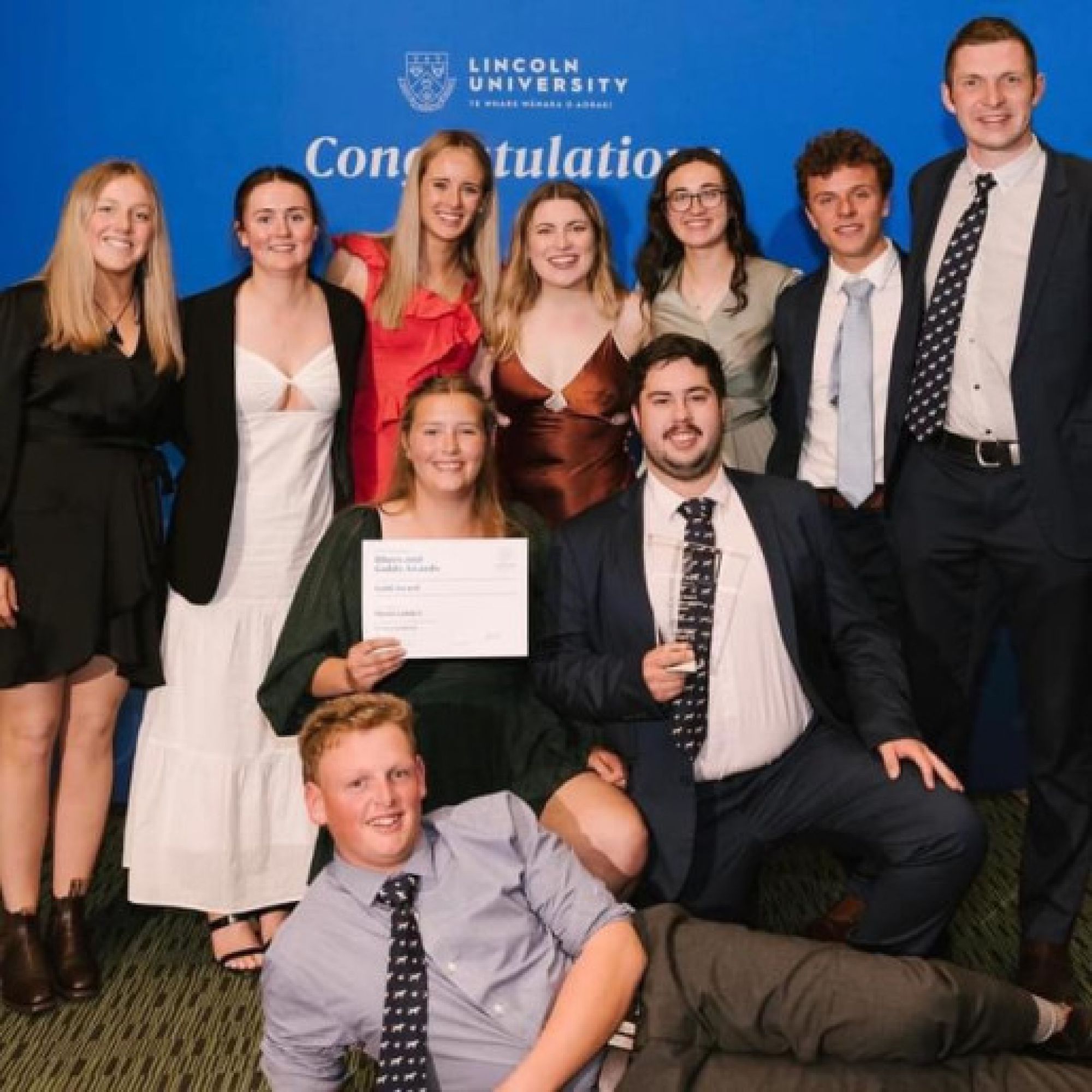
Emily said there were 15 active members, but many other people supported the club when events are on.
"For example, twenty-seven people participated in the apple picking fundraiser at the Waipopo Apple Orchard."
She said club members were from Northland to Southland "and everywhere inbetween" and studied a variety of qualifications ranging from Agricultural Science, Agribusiness, Valuation, and Commerce.
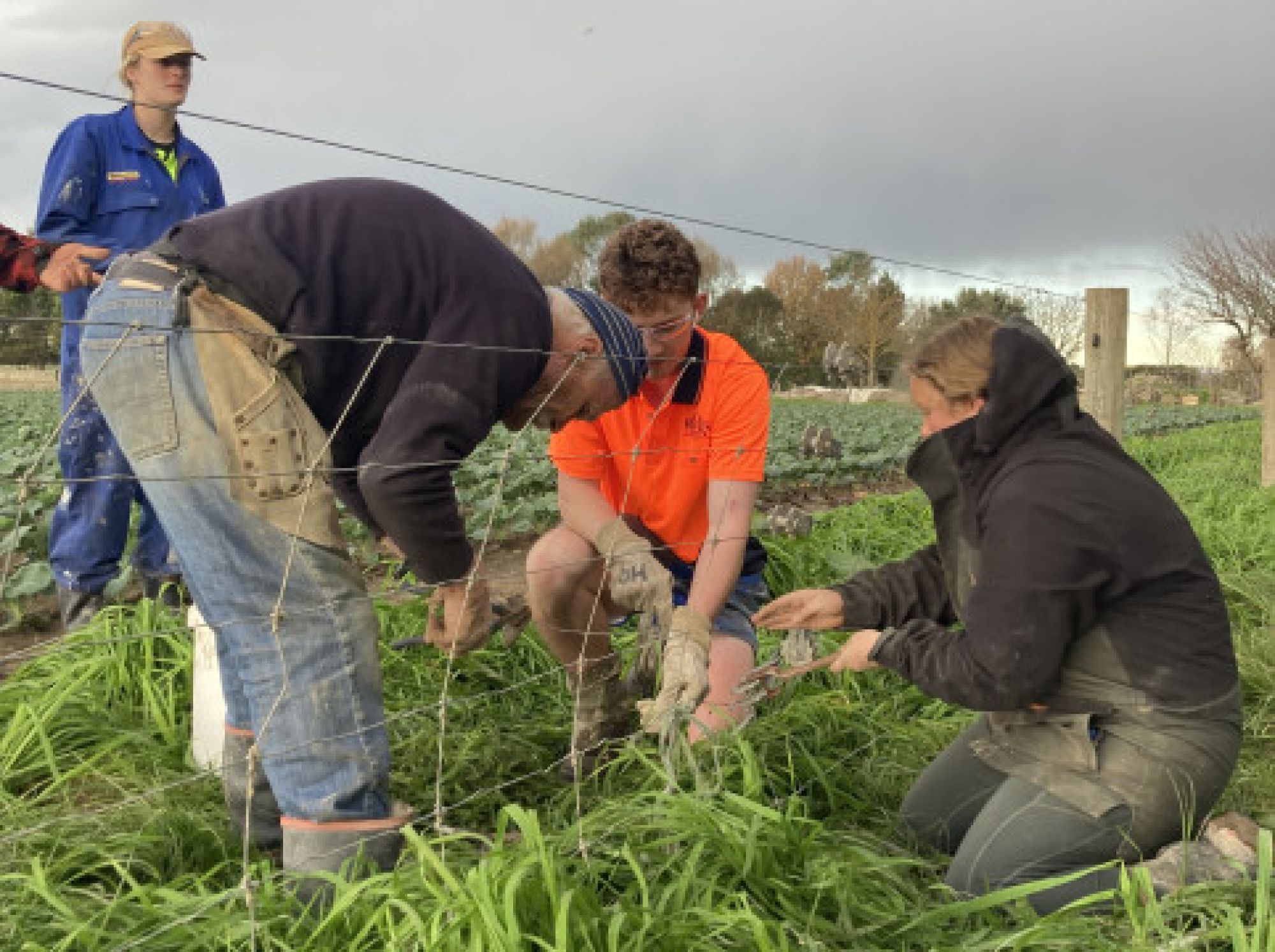

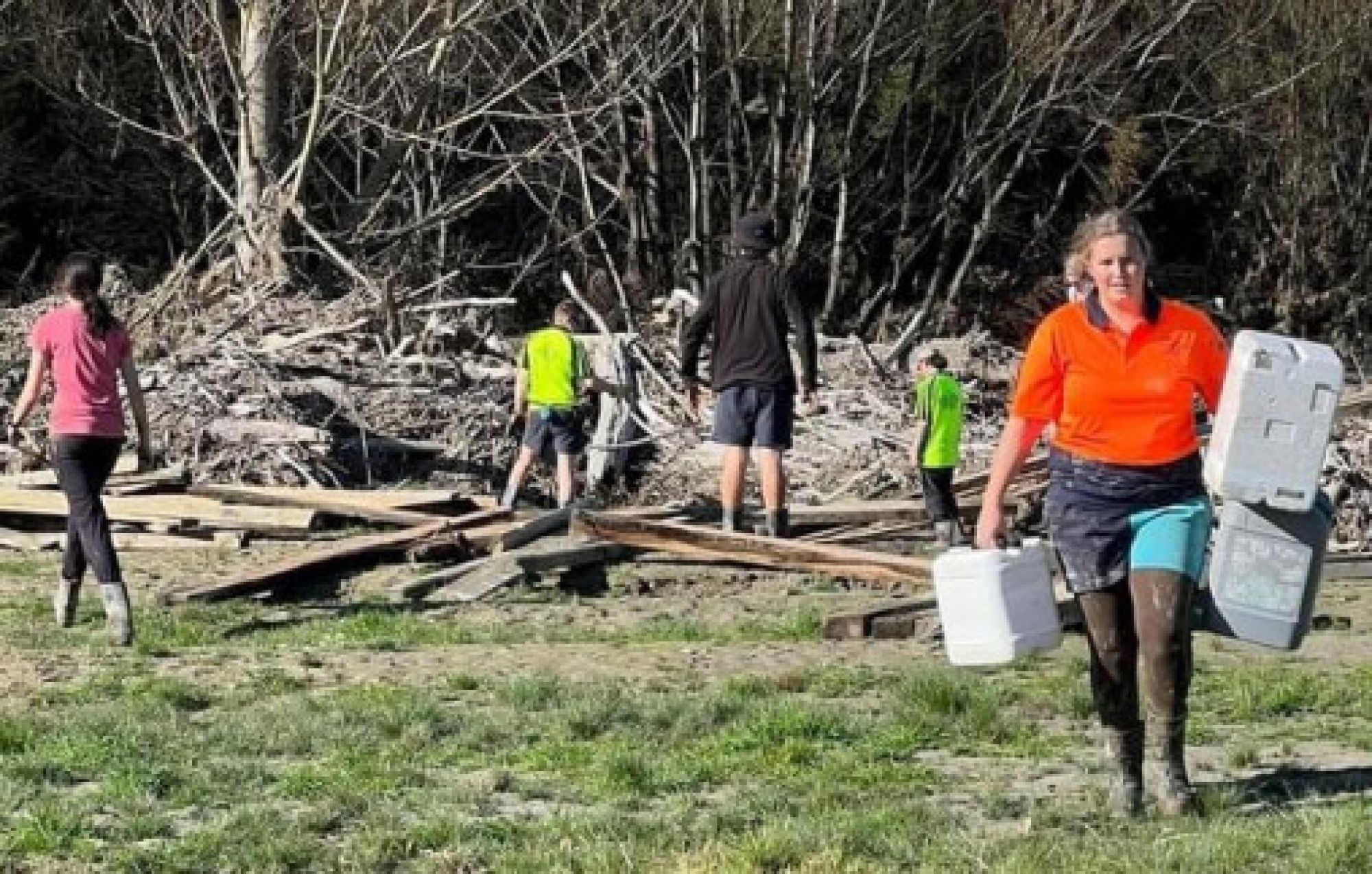
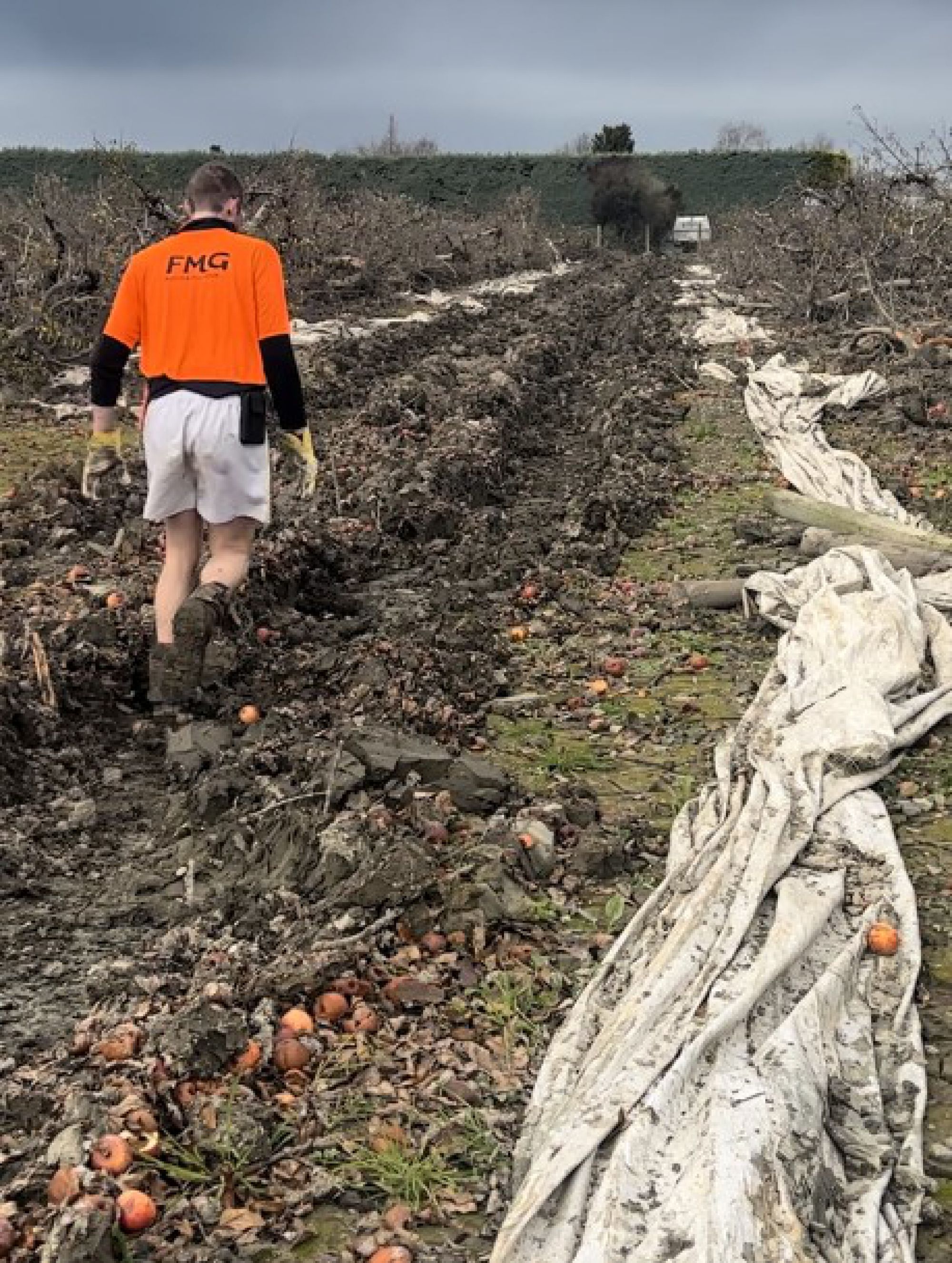
The Handy Landys in action
"People join Handy Landy's to make a positive difference in rural communities. Many of the club members come from rural communities and have witnessed the damage of natural disasters."
"Many of us intend to be a part of these rural communities upon graduation and realise that assisting the rural community is beneficial for the current, and future health, of the sector," Hamish said.
He said many members recognised that they may also find themselves in a situation where assistance is needed and were "paying it forward".
"The comradery that occurs on trips and the learnings and connections made between students and with farmers is another huge drawcard," Emily added.
"We choose to help people based on the needs that they require, and the capacity we have to respond to those needs. If the job is outside our abilities, we will pass the need onto other industry bodies.
"We are striving to expand our connections within the industry to increase the population of people we can help."
They are starting to organise events for the beginning of 2024, particularly Club's and Markets Day where new students will have the opportunity to join the team, as well as looking into future fundraising opportunities.
Hopefully, they won't need to be called on again soon, but you can be sure they will be watching out for weather alerts to be there if the rural community could use a hand.
|
|
|
|

|
Award winner's sporting talent recognised early
Jasmine Donald has been juggling top-level sport and studying for a long time...
read more
Award winner's sporting talent recognised early
Jasmine Donald has been juggling top-level sport and studying for a long time.
The precocious football talent was first picked by the Tasman United Women's Senior Team to play in the Christchurch Women's Premier League as a 12-year-old.
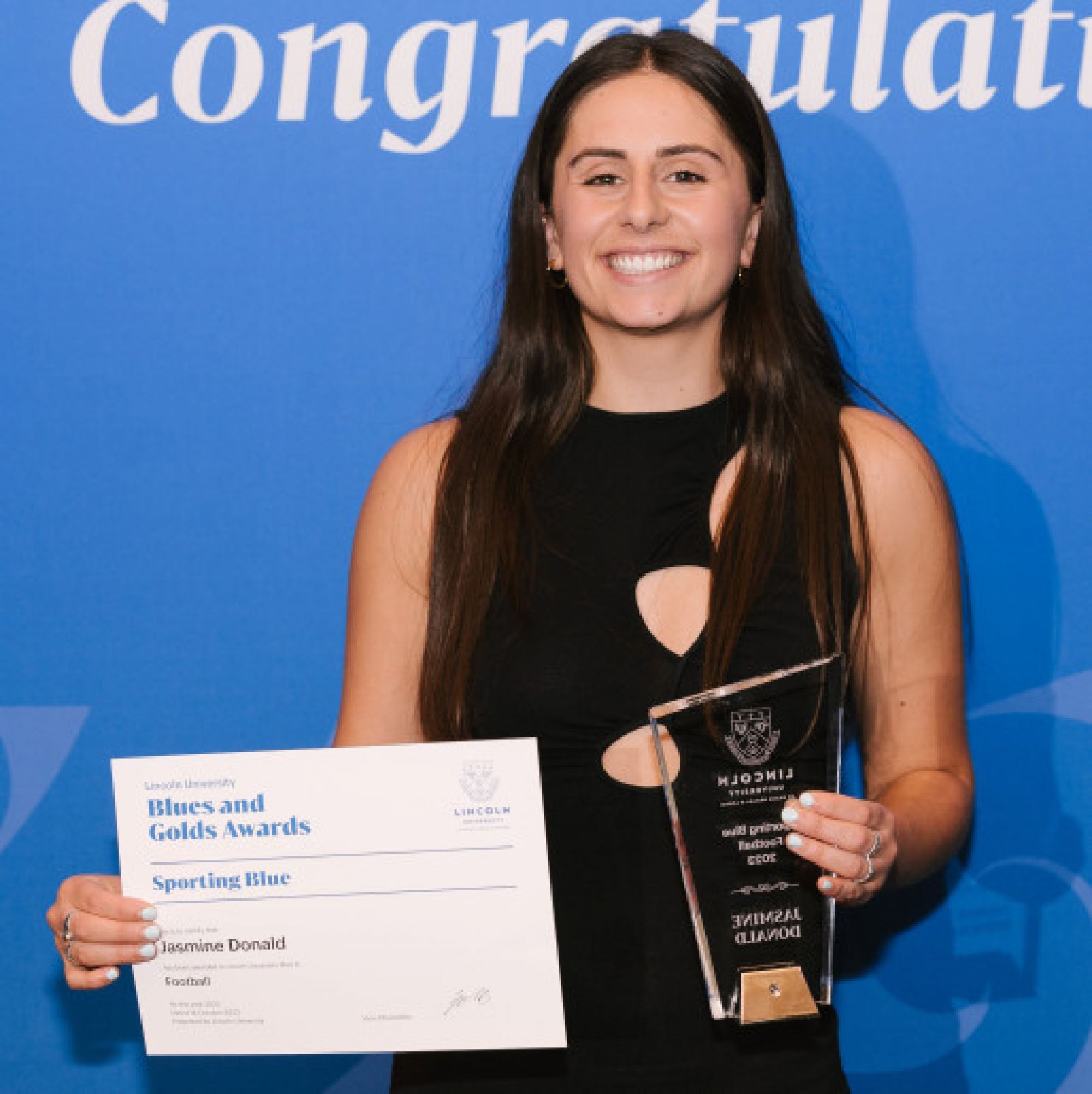
She was the recent recipient of a Blues Award, which recognise sporting achievement by Lincoln students, and has been a Sports Scholar for the last three years while undertaking a Bachelor of Environmental Policy and Planning (Honours).
Jasmine grew up in Nelson, and was a Nelson College for Girls pupil before her football talents were again recognised, this time moving halfway through Year 11 to Christchurch to take up a sports scholarship at St Andrew's College.
She still plays in the Christchurch League for the Universities club, but has also turned out for Canterbury United Pride for the last five years in the National Women's League, helping them win it in 2018, 2019 and 2020.
Of Taranaki iwi, this year she was part of Ngā Wahine Whanapoikiri, the New Zealand Māori women's side who played against the Australian Indigenous side in a three-test series, and was proud to be named as captain for one of the matches.
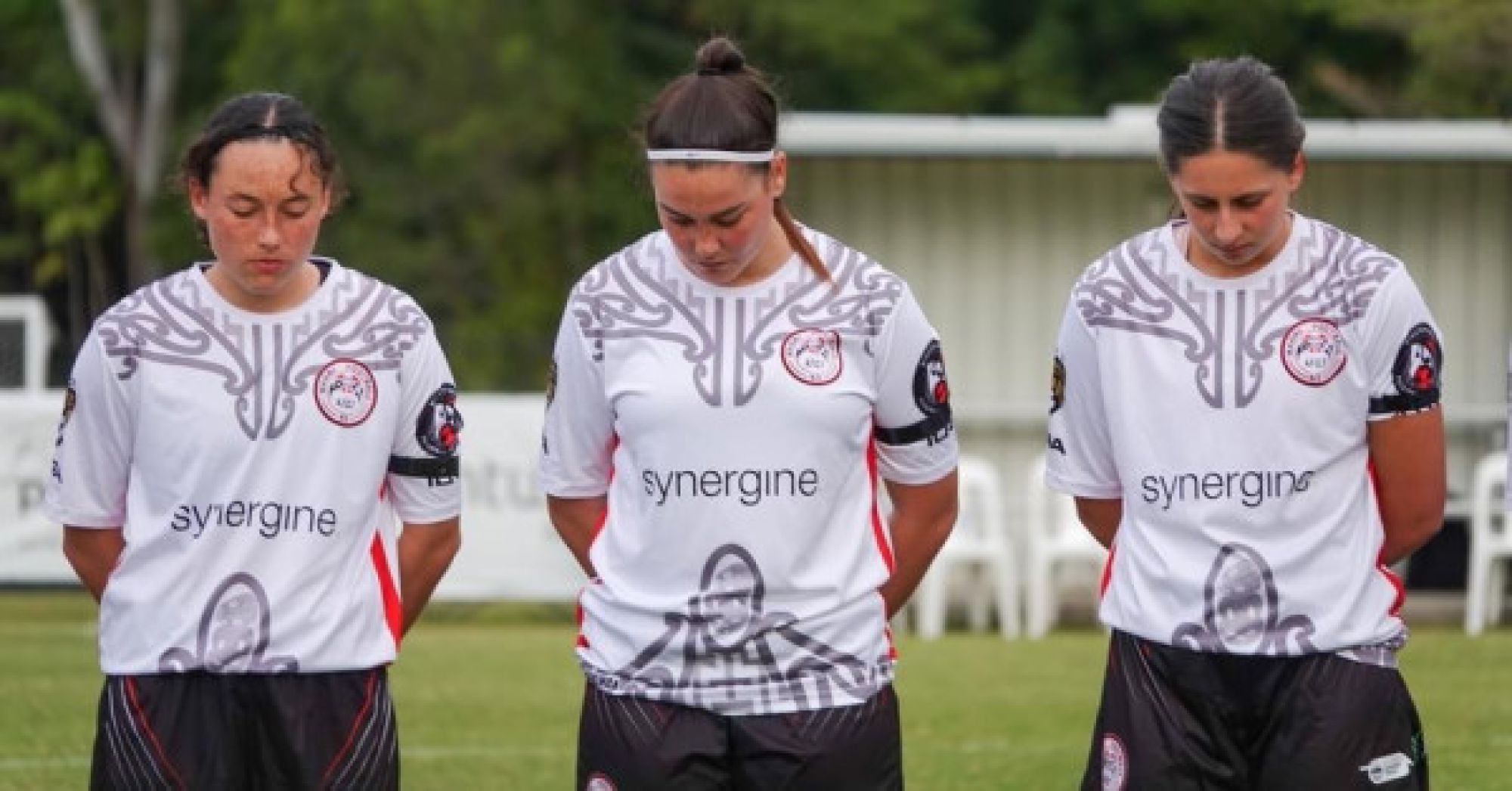
She first made the team in 2020 in a series against the same opponents, while the year before she travelled to America to play for the New Zealand Secondary School U19 Girl's team and captained the side.
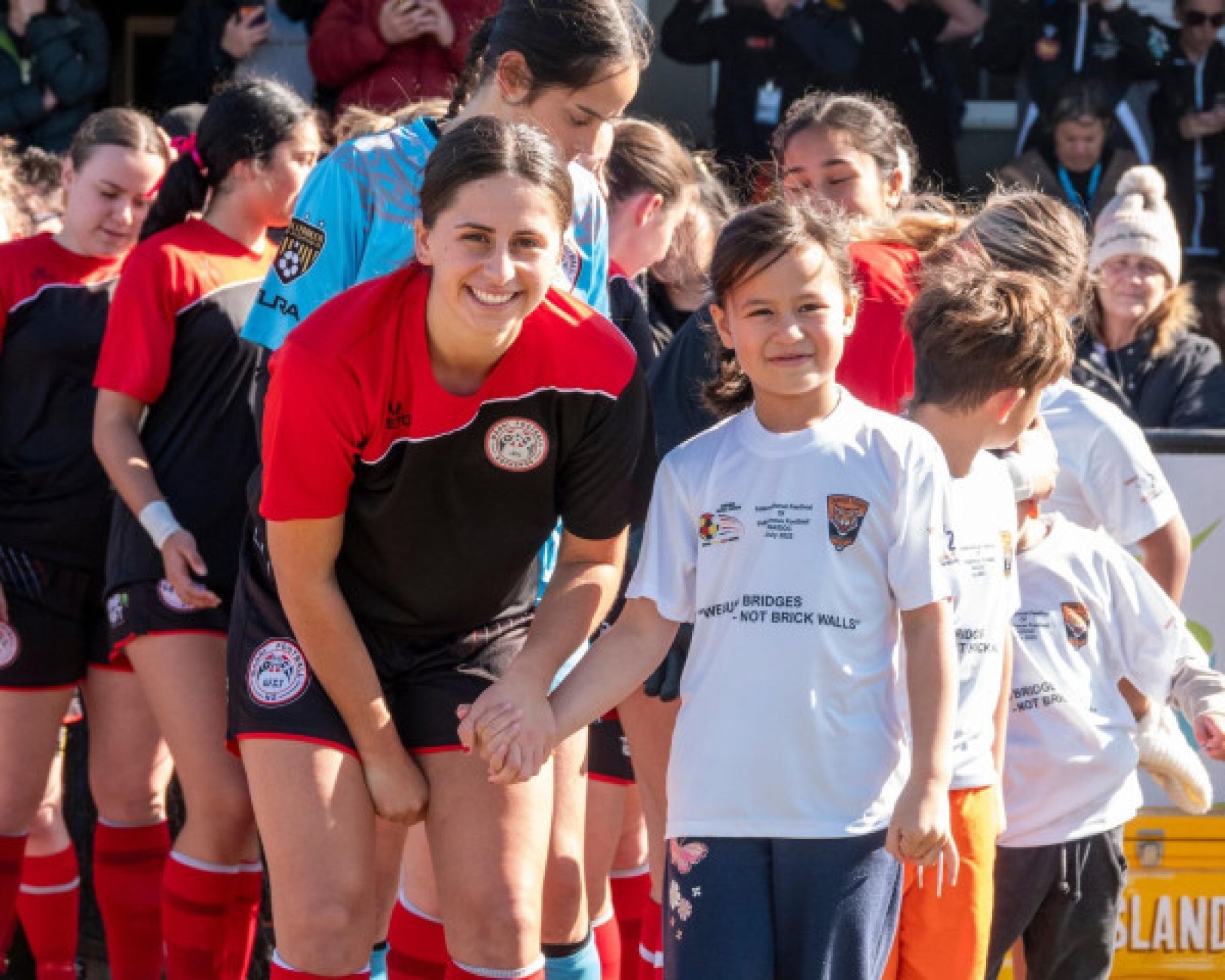
Images: Jasmine as part of the Ngā Wahine Whanapoikiri side in Australia.
She also coaches the U16 Girl's South Island Māori football team.
"It can get pretty hectic with sport and managing full-time study," Jasmine said.
"I feel fortunate to have been a part of the sports scholarship program for the past three years and this has definitely helped when balancing these commitments.
"Having such a good gym facility on site I am able to use this and then head over to uni which gives me a lot more time to focus on my studies."
"Once I have graduated, I hope to continue playing football to a high level and I'm excited to be able to play for Ngā Wahine Whanapoikiri, as well as about the future of the team."
But she doesn't only have sport in her sights.
She is part of Lincoln's Māori student association Te Awhioraki and was in the Kapa Haka group which performed at the recent Te Huinga Tauira.
"Being a part of Te Awhioraki has also been a big highlight with another group of mates.
"Finishing university, my aim dream job is to secure a role as a graduate planner working with iwi. The opportunity of working with an iwi really excites me and would be a natural fit with my love of planning."
|
|
|
|

|
Consultation heads new weapon to combat wasps
Lincoln Professor Amanda Black is at the vanguard of a new approach to science, but she's not in the lab this time.
...
read more
Consultation heads new weapon to combat wasps
Lincoln Professor Amanda Black is at the vanguard of a new approach to science, but she's not in the lab this time.

She is part of a collaborative Endeavour Fund awarded project with the University of Otago "Whatu raranga o ngā koiora – weaving cultural authority into gene-drives targeting wasps" which has a five-year duration and secured an almost $11 million grant.
With the melodic songs and calls of native birds being replaced by a low menacing thrum of hordes of the introduced wasps in some of New Zealand's forests, novel ways to combat the destructive pests are being sought.
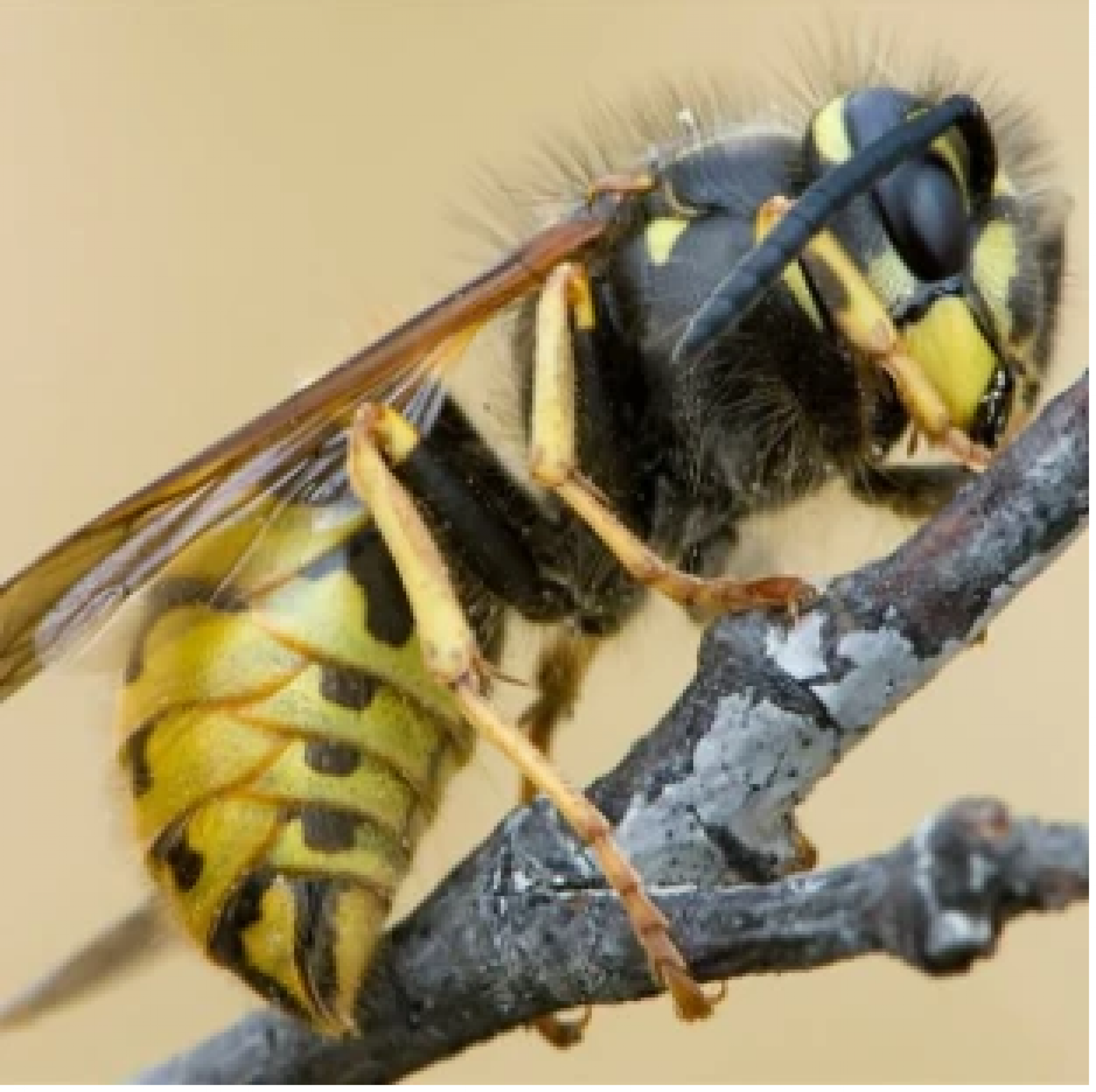
Wasps were accidentally introduced into New Zealand in the 1940s
Professor Black, who is the Director of Bioprotection Aotearoa, a national Centre of Research Excellence based at Lincoln University, said chemicals were proving ineffective against the growing problem, so something new had to be tried.
Her role in the project is to talk to the people who would be directly affected by its practical application, such as around issues like gene editing, to see the most appropriate way for it to be delivered to meet cultural values and gain social acceptance.
She said it pointed to how projects would be run in the future.
"The social research feeds into the science."
"Wasps are a massive problem," Professor Black said.
"There is a greater biomass of wasps than native birds in some New Zealand forests. They kill baby birds and out-compete native insects."
The beech forests at the top of the South Island have the highest densities of invasive wasps in the world.
Introducing a gene drive into an insect like wasps starts in the lab where you insert a harmful trait into the queen germline of the DNA that is inherited by offspring.
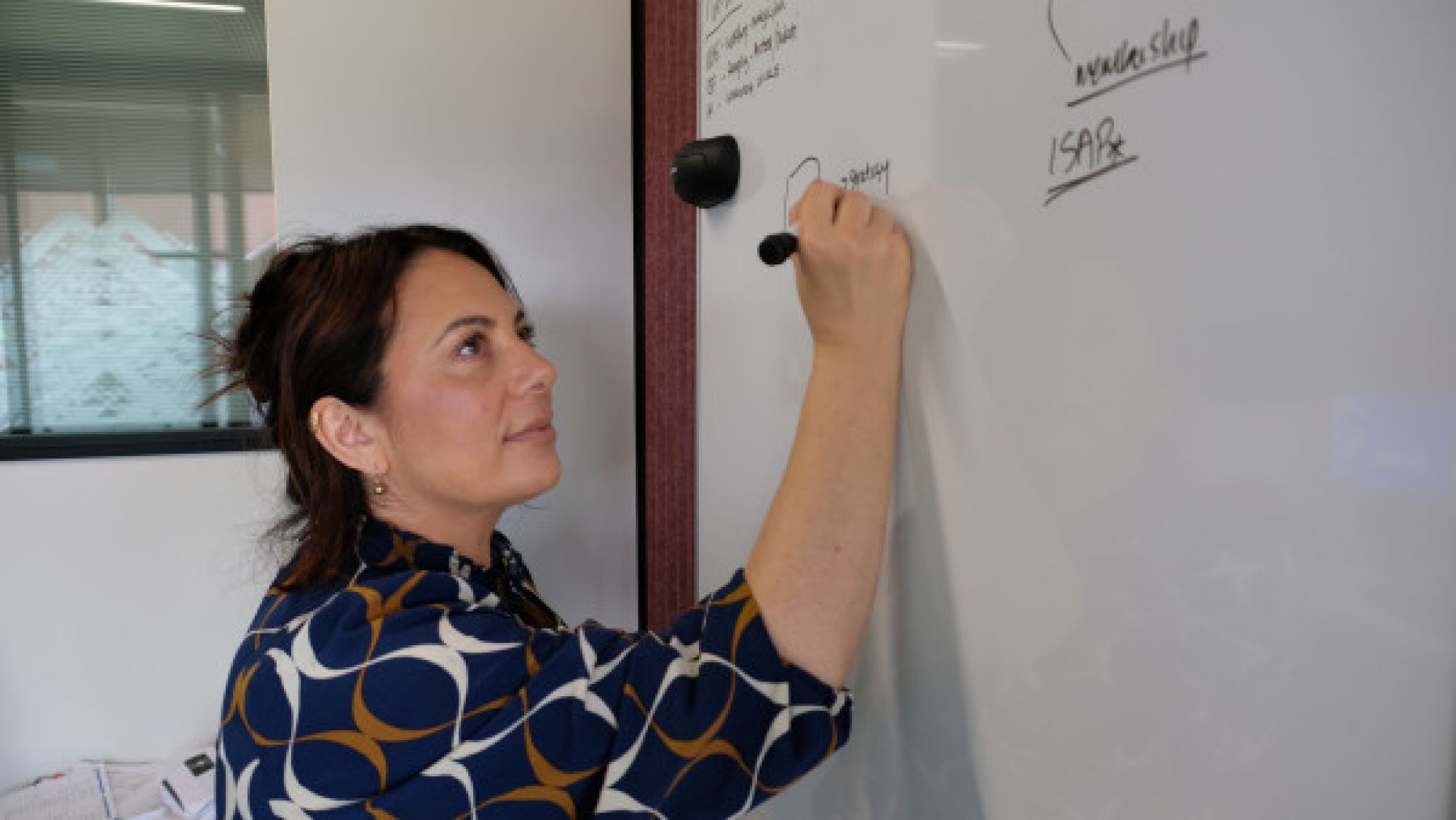
She said editing DNA could introduce a fatal flaw into the wasps, and gene drives could ensure the change is spread amongst the population, suppressing numbers.
Being social insects, infected queens pass on these traits to their colony, so it will be particularly effective among wasps.
She said it would be a world first to use the gene drives to combat the pest, and as there were no native wasps, and the wasps don't breed with other species, the changes would be contained.
"There are various ways to implement gene drives," she said, "and the project will be co-designed with the affected groups."
Her team will begin gathering views and would run scenarios and test constructs, and ensure the science was understood and this would assist with policy development.
Though not splicing the genes, Professor Black's role is to co-ordinate the life of the project and ensure the proposed technology sits within the values of people in the most affected areas, including frustrated fruit growers whose produce is covered in the pests and aligns with the cultural frameworks of iwi.
"The idea is to bring people along on the journey, democratising the process so it feels comfortable and familiar, and not imposed on them.
"There are some concerns around the unknown which are valid," she said, "and it can evoke a lot of emotions".
She said there were also regulatory groups involved, such as DOC, EPA and MPI, and the work would inform policy.
|
|
|
|

|
Lincoln University to host 2024 South Island Dairy Event, celebrating its 25th event
The highly-anticipated South Island Dairy Event is returning to Lincoln University in June 2024, marking a significant milestone as it celebrates its 25th event... read more
Lincoln University to host 2024 South Island Dairy Event, celebrating its 25th event
The highly-anticipated South Island Dairy Event is returning to Lincoln University on the 25-26 June 2024, marking a significant milestone as it celebrates its 25th event.
The event, a cornerstone of New Zealand's dairy industry, will be chaired by Jonathon Hoets, an equity partner of Kairoa Dairies Limited, a 790-cow farm in Mid Canterbury, for the Rylib Group.
The South Island Dairy Event (SIDE) is a renowned gathering of dairy farmers, rural professionals and industry partners, that offers a platform for networking, knowledge sharing, and showcasing the latest advancements in the dairy sector. The 2024 theme for the two-day conference is "Excelling through Change".
SIDE's rich history dates back to its first event in 1999, and over the years, it has grown to become an invaluable resource for the dairy industry. The decision to return to Lincoln University, the site of the first SIDE event, for its 25th edition reflects the event's commitment to its heritage and the valuable relationship between the university and the dairy community.
Jonathon Hoets, who is the Event Chair for 2024, brings a wealth of experience and knowledge to the role. With a deep understanding of the dairy industry and its evolving landscape, Hoets and his committee of local Mid Canterbury dairy farmers are well-equipped to ensure that the 25th SIDE event is an unparalleled success.
Governance Group Chair, Andrew Slater, expressed his excitement about bringing the event back to Lincoln University. "SIDE has a special place in our hearts, and we are thrilled to celebrate our 25th event at the very place where it all began. Lincoln University has been a steadfast partner in advancing the dairy industry, and we couldn't think of a better location to commemorate this milestone."
The 2024 South Island Dairy Event is poised to feature a robust agenda, including three keynote speakers, interactive workshops, a field trip to view on-farm demonstrations, and a range of knowledgeable industry experts and farmers discussing the latest innovations and information in the dairy sector. It will provide a unique opportunity for industry professionals, researchers, and leading dairy farmers to exchange ideas, best practices, and to collectively drive the industry forward.
Registrations for the 2024 open in April, but for more information about the 2024 South Island Dairy Event, including sponsorship opportunities, please visit www.side.org.nz.
The South Island Dairy Event (SIDE) was established in 1998 to provide a forum for those involved in the South Island dairy industry to evaluate and apply knowledge, skills and technology to their business.
Run by farmers for farmers, SIDE lines up industry experts for keynote addresses, networking sessions and practical workshops in a revitalised format. Presenters include farmers, researchers, consultants, veterinarians, accountants, and scientists. The interactive style of the workshops encourages plenty of discussion and the exchange of ideas. The programme is designed to promote thinking and debate, as well as provide a space for like-minded farmers to network and find inspiration and motivation.SIDE presents a unique opportunity to connect and engage with this diverse group of farmers.
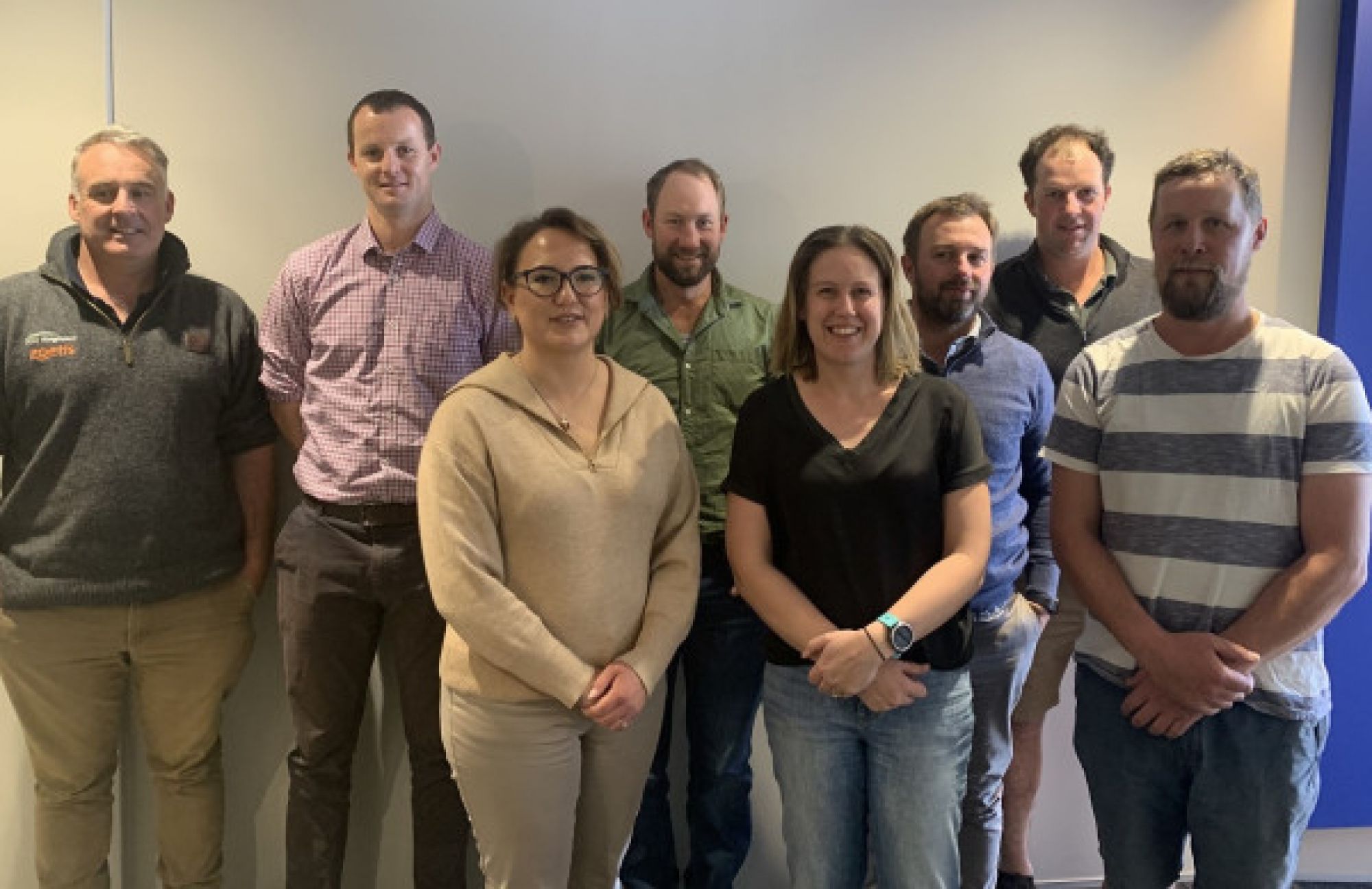
The 2024 SIDE Organising Committee from L-R: Will Perriam-Lampp, Jonathan Hoets, Tracey Perkins, Robin Horblow, Stacey Hoets, Russ Young, Henry Norris, Brad Fallaver
Absent: Anna Hall, Abby Rawcliffe and Michelle Coates
|
|
|
|

|
Growing cities eat up fertile land, but housing and food production can co-exist
On The Conversation, Lincoln University Senior Lecturer Dr Shannon Davis discusses an issue faced by cities in Aotearoa and all over the world... read more
Growing cities eat up fertile land, but housing and food production can co-exist
On The Conversation, Lincoln University Senior Lecturer Dr Shannon Davis discusses an issue faced by cities in Aotearoa and all over the world: population growth and housing shortages mean urban expansion often encroaches on rural productive land.
Fertile soil is one of the reasons why many cites were originally set up in certain sites, but now the loss of these food-producing landscapes to urban growth is widely recognised as a concern to local food security.
The edges of cities – the 'peri-urban' zone – are critically important for urban resilience. Apart from food, they supply ecosystem services such as flood and stormwater mitigation, cooling and climate regulation, carbon storage, waste treatment and recreation.
It could be said that the conversion of peri-urban agricultural land for urban expansion unwittingly undermines the very life support on which city dwellers depend.
Urban resilience and food production
Peri-urban zones have an important role in supplying locally produced food. This helps reduce transport emissions to meet New Zealand's emissions reduction targets. But there is a growing disconnect between where New Zealand's food is produced and where the majority of New Zealanders live.
The dominant approach to urban growth is through greenfield development (building on undeveloped land), and this ultimately compromises the productive land belt around many cities and settlements. This can result in the irreversible loss of some of our most fertile soils.
Shannon Davis's research explores opportunities arising from food production and housing co-existing within peri-urban zones, including the development of five land-use design concepts developed to address the peri-urban squeeze in Ōtautahi Christchurch.
Read the full article that explores the housing-agriculture conundrum at The Conversation here >>
Sign up to receive The Conversation newsletter here >>
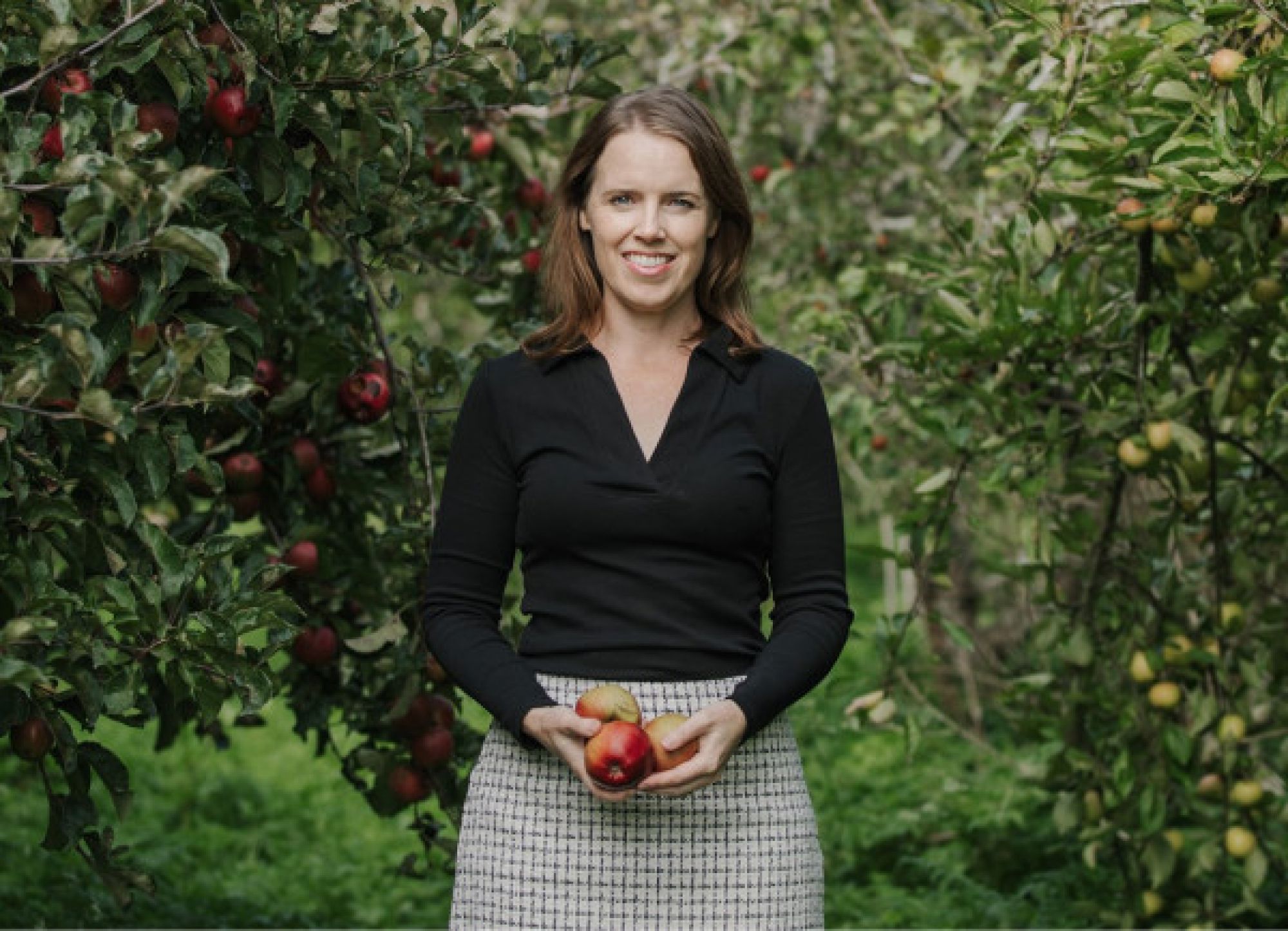
Dr Shannon Davis (image courtesy Shepherdess Magazine)
|
|
|
|

|
Driver licence handbrake released with help from K'aute Pasifika
The resumes of Lincoln University Pasifika students are getting a turbo-boost with the help of a North Island organisation... read more
Driver licence handbrake released with help from K'aute Pasifika
The resumes of Lincoln University Pasifika students are getting a turbo-boost with the help of a North Island organisation.

Jay (of K'aute Pasifika), Sinitalela (LUPISA President), TeArohanui, Kihere, (both Te Manutaki), and Stephen and Misi (both K'aute Pasifika).
Hamilton-based K'aute Pasifika supports Pasifika people in a wide range of areas and has helped fund three Lincoln students to gain their drivers' licences, which will enhance their employability. The team also works with secondary students to find the best path for them after they finish high school.
The funding for drivers' licences came about following a visit from members of K'aute Pasifika to Lincoln's recent Open Day, to learn more about the university's programmes and support services.
They met with members of Lincoln's Te Manutaki team, who support Māori and Pasifika students, as well as the Lincoln University Pacific Island Student Association (LUPISA).
During the visit, the team learned that many LUPISA student members couldn't afford to gain their driver's licence, so they decided to assist with funding.
The K'aute Pasifika members loved touring the campus, describing it as beautiful and easy to get around, and said all the staff they met were friendly and welcoming.
They especially enjoyed meeting Lincoln Pasifika students, learning more about why they chose the university.
Lincoln's Student Liaison Team plans to partner with K'aute early next year to hold an information event in Hamilton for prospective Pasifika students, to continue to grow the relationship and encourage students to attend Lincoln.
|
|
|
|

|
Kellogg's Celebrate K50 Graduation
Kellogg Programme Alumni, Rural Leaders' investing partners, and industry gathered on Thursday 30th November... read more
Kellogg's Celebrate K50 Graduation
Kellogg Programme Alumni, Rural Leaders' investing partners, and industry gathered on Thursday 30th November, at Lincoln University's new Waimarie Building, to celebrate the 50th Kellogg cohort's graduation.
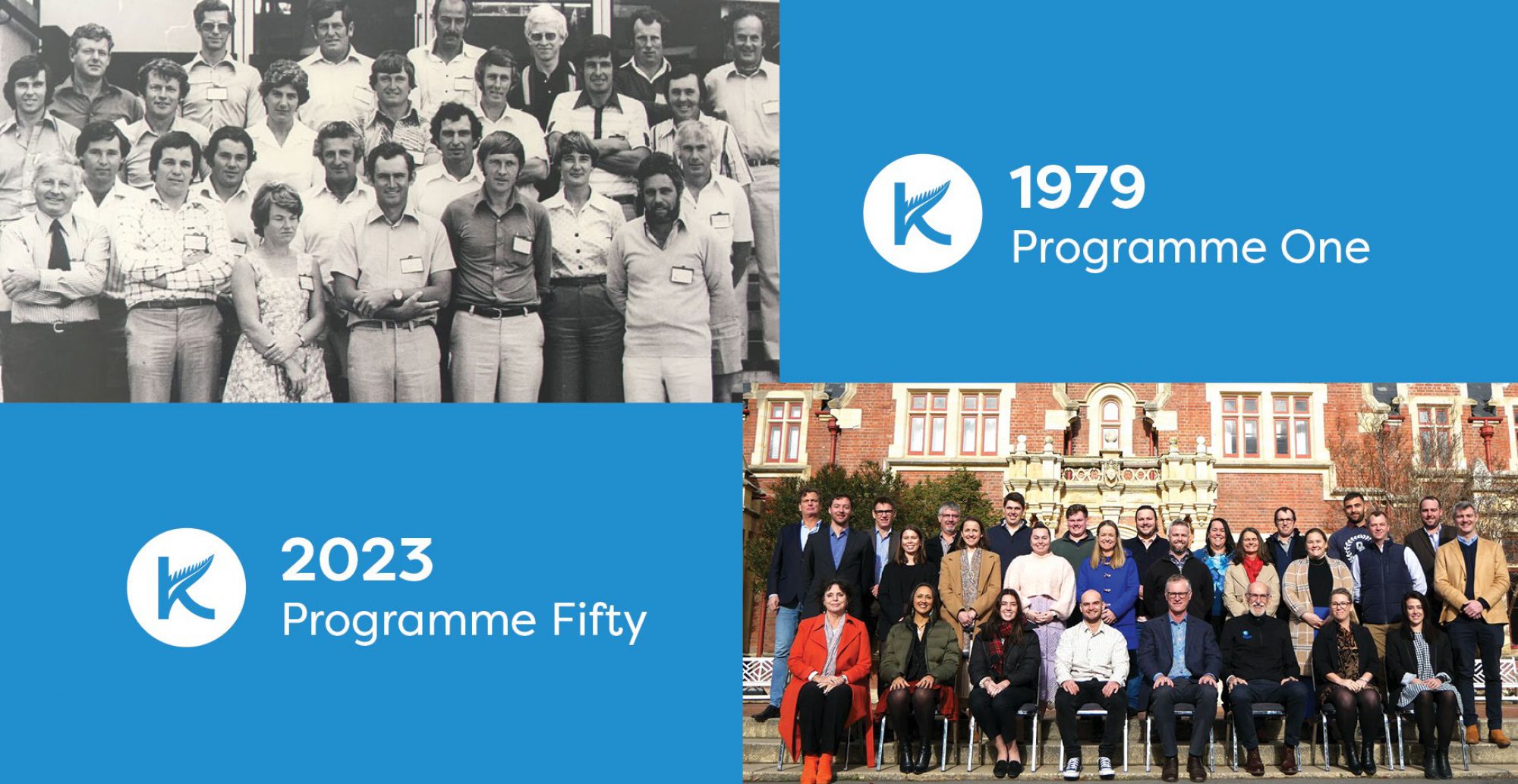
Since 1979 the Kellogg Rural Leadership Programme has helped deepen leaders' capability in industries across the sector, with 1075 Kellogg alumni leading businesses, advancing community and social enterprises, and advocating for better environmental outcomes.
.jpg?v=-960263006)
Patrick Aldwell and Kate Scott
Kate Scott, Rural Leaders Chair, Lisa Rogers, Rural Leaders CEO, and Dr Patrick Aldwell, Kellogg Programme Academic Director, spoke at the event, with Dr Aldwell sharing more on the Programme's early beginnings. Dr Scott Champion, Programme Director, joined the three speakers to award certificates.
A special thank you to Rural Leaders' Strategic, Programme, Service Partners, and Academic Partners (Lincoln University) who came to meet the 25 new Kellogg graduates. Your ongoing support helps deliver ever more capable leadership

|
|
|
|

|
Landscape students' exhibition offers curated journey across the country
Lincoln University students from the School of Landscape Architecture took the public on a curated journey across Aotearoa recently... read more
Landscape students' exhibition offers curated journey across the country
Lincoln University students from the School of Landscape Architecture took the public on a curated journey across Aotearoa recently, with an exhibition of their major design portfolios.
The final year Bachelor of Landscape Architecture and Master of Landscape Architecture students spent 2023 immersing themselves in work that involved combining their advanced skills into extensive portfolio pieces based on different sites around New Zealand.
Their projects investigated aspects of urban design, coastal design, ecological restoration and more, with each offering a unique, innovative solution for a real-world issue.
The result was their exhibition, Horizon, which was held at All Souls Anglican Church in Merivale and showcased the budding landscape architects' unique visions and talents.
Bachelor of Landscape Architecture (Grad Entry) student Josh Allan, who took on the role of marketing team leader for Horizon, said the students were proud to display their exceptional projects.
"From grand master plans down to the finest details, each project is a testament to their passion, dedication and creativity."
Josh's project aims to make Kaiapoi a key North Canterbury township separate from Christchurch and home to "an expansive range of residents who can seamlessly travel to and from the city through an extensive, fast-paced public transport system".
"Kaiapoi will have a vibrant new town heart for its community, centred around its form as a river town, while delving into its deep cultural roots," he said.
His plan would facilitate an urban revitalisation of Kaiapoi, enhancing economic growth, cultural and social engagement and ecological factors, as well as addressing flooding risk and rising seal levels.
"Kaiapoi could become home to a range of residents, welcoming and accommodating those in surrounding communities forced away from their homes due to coastal inundation."
Bachelor of Landscape Architecture student Hamish Murphy's project focuses on a revamp of Wynyard Quarter to Te Ara Tukutuku along the coastline of Tamaki Makaurau Auckland's CBD. It aims to address issues of sea level rise, urban sprawl and the embedded reliance on cars currently experienced across the city.
"By consolidating higher densities in walkable centres around main rapid transit links, we can create a more sustainable city that allows the environment to evolve," Hamish said. "The current projection for the city is a 1m sea level rise across the next 100 years, with the distinction between land and sea creating a more dynamic landscape.
"By designing for this change in a 50-year plan, we have time to remediate and consolidate land along the waterfront that will allow a controlled managed retreat of low-lying coastal areas."
Master of Landscape Architecture student Ella Christian-Farrow's project proposes turning Kauri Mountain, near Whangārei, into Nukurārangi Regional Park, a location that embodies sustainable land use practices, restores the mauri of a Te Tai Tokerau mountain-to-sea ecosystem and creates a destination for people to learn and explore.
"As the land is not suited to conventional farming, it will be phased out, backed by a kaitiakitanga approach and alternative indigenous productive land use," Ella said.
"Nukuārangi Regional Park will allow biodiversity to flourish, enhancing a place for people to explore via range of recreational experiences and learn through first-hand interactions with a diverse natural environment."
Learn more about the students' designs by visiting the Horizons Instagram account.
Lincoln University's School of Landscape Architecture graduates are highly sought-after within New Zealand and globally.
During their study programmes, students obtain a broad understanding of the many factors that constitute a landscape architect, including spatial design, ecology, planting knowledge, site analysis, hardscape design and construction, sustainability and historical and cultural contexts.

 Pictured top: Hamish Murphy and Josh Allan, two of the landscape architecture students who took part in the Horizons exhibition.
Above: The students' projects displayed at All Souls Anglican Church in Merivale.
Pictured top: Hamish Murphy and Josh Allan, two of the landscape architecture students who took part in the Horizons exhibition.
Above: The students' projects displayed at All Souls Anglican Church in Merivale.
|
|
|
|

|
Scholars heading home to make a difference
Three graduands, from different nations and areas of study but united by their aim of making a difference at home... read more
Scholars heading home to make a difference
Three graduands, from different nations and areas of study but united by their aim of making a difference at home, were celebrated at a special ceremony on 14 November.
 Lavenia Karavaki, left, Helen Moe David and Phoukhaokham Xaymounty
Lavenia Karavaki, left, Helen Moe David and Phoukhaokham Xaymounty
Maanaki NZ scholars Lavenia Karavak, of Fiji, Helen Moe David, of Papua New Guinea (PNG) and Phoukhaokham Xaymounty, of Laos, were feted in front of family and friends, as they are due to return home before next year's Lincoln graduation in May.
The scholarship programme is a partnership between Lincoln University and the Ministry of Foreign Affairs and Trade (MFAT) to bring students from developing nations to New Zealand to grow their skills and knowledge for their home countries' social and economic development.
Lavenia, who completed a Master of Environmental Policy and Management, plans to establish a sustainability consultancy agency in Fiji, Helen wants to use her Master of Horticultural Science to increase food security in PNG, and Phoukhaokham gained a Master of Business (Finance) with the aim of easing the financial challenges facing Laos.
"I hope that my qualification from Lincoln will assist me in becoming an expert in the Lao financial industry, where I have worked for more than 10 years," Phoukhaokham said.
"As Laos is currently facing economic challenges, the strong academic background in a global business context it gives will be a tool to ease the impact of the crisis."
Lavenia aspires to utilise her degree to establish an agency dedicated to promoting environmental sustainability in Fiji.
"My goal is to make a meaningful contribution to the protection and preservation of our environment by providing expert guidance and innovative solutions in the realm of environmental policy and management."
Helen wants to help farmers in PNG, with more than 80% of the population earning a living from subsistence agriculture.
"The increase in population and change in weather patterns has impacted food production," she said.
"Food security is becoming an issue where people need to have access to sufficient, safe, affordable, and nutritious food for their wellbeing."
Either as a volunteer or employee in an agriculture organisation, she wants to "apply the knowledge and skills gained from my study in Lincoln University to help PNG farmers understand and adopt new ways of farming practices".
She regarded Lincoln University as a "home away from home".
"It is a very friendly and multicultural campus community. It is the smallest university in New Zealand, with more learning environments, where I get to know a lot of people.
"Everyone has a good fun attitude. I would be proud to call myself an adopted Kiwi.
"It's not always been easy, and I sometimes felt homesick. But at the end of the day, I have friends to hang out with, talk to, laugh, and have fun. My stay in Lincoln was one of the most memorable moments of my life."
Lavenia said she had "thoroughly enjoyed the learning experience, immersing myself in my field of study and gaining valuable knowledge".
"Interacting with fellow students from diverse backgrounds has been a rewarding experience, as I've had the opportunity to learn from their unique perspectives and insights.
"Additionally, being in Aotearoa New Zealand has allowed me to appreciate and embrace the rich Māori traditions and culture, which have added a significant dimension to my overall experience.
"It was a challenging journey, but I am deeply grateful for the valuable experience it has afforded me. This is an experience that I will hold dear and carry with me as I return home."
Phoukhaokham said he came to Lincoln to study "because it is one of the world's best small universities".
"In terms of staff numbers, the university has a good proportion of staff to its students when compared to other New Zealand universities.
"Apart from its academic reputation, the environment is great for student life and for studying, as it is quiet."
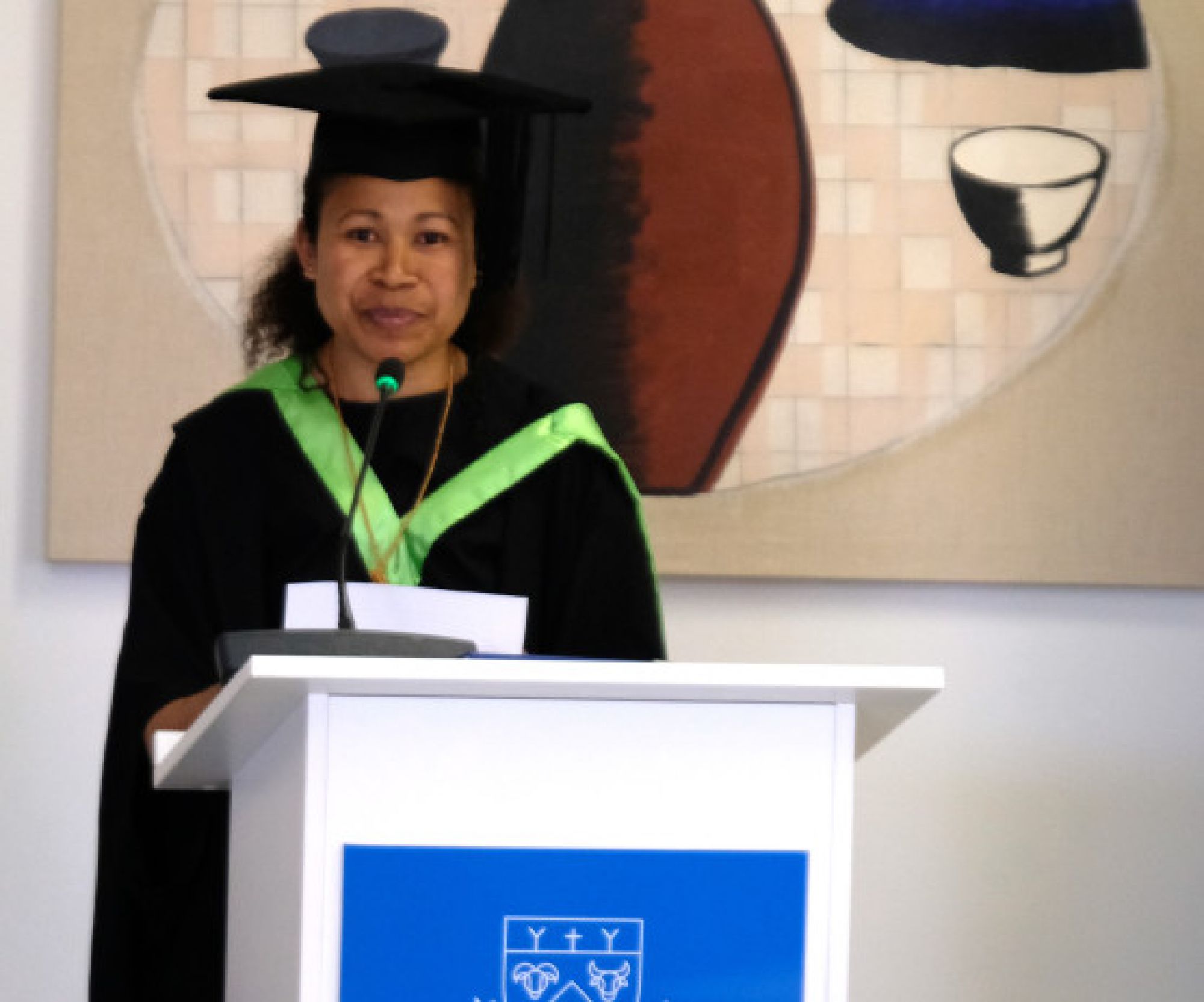
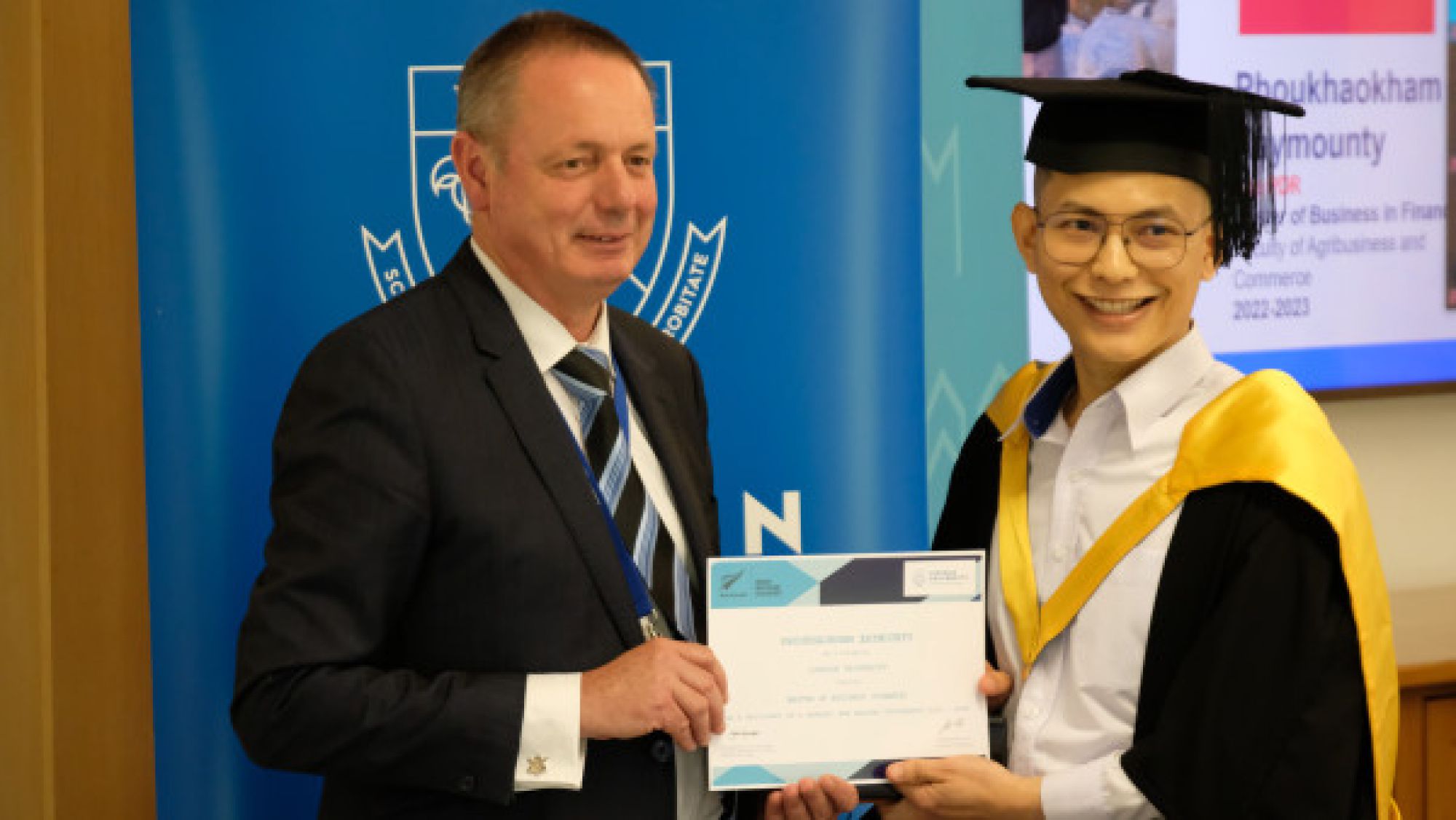
Dr Hamish Cochrane, Director, Student Administration and Student Health, presented certificates to the graduands.
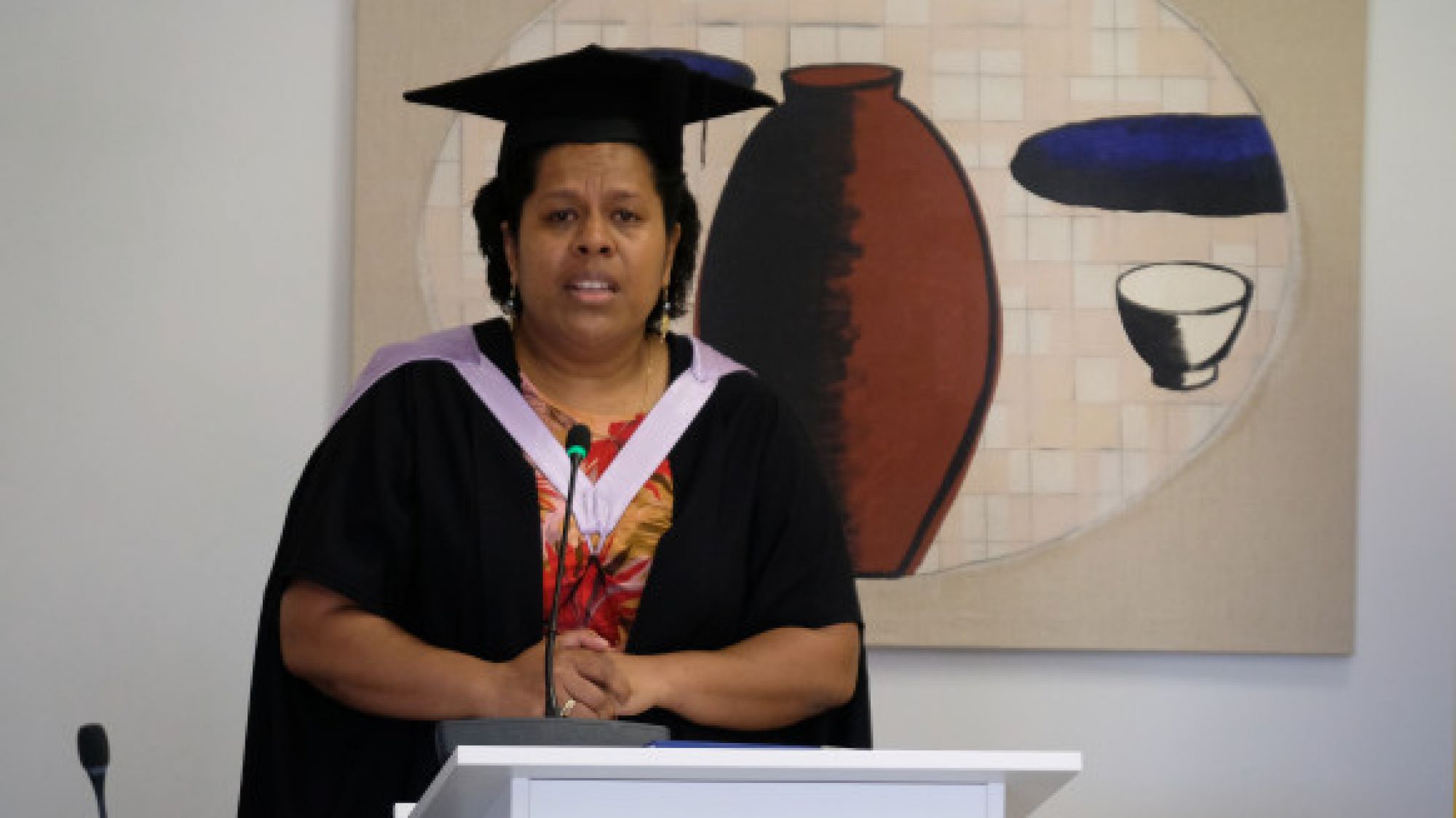
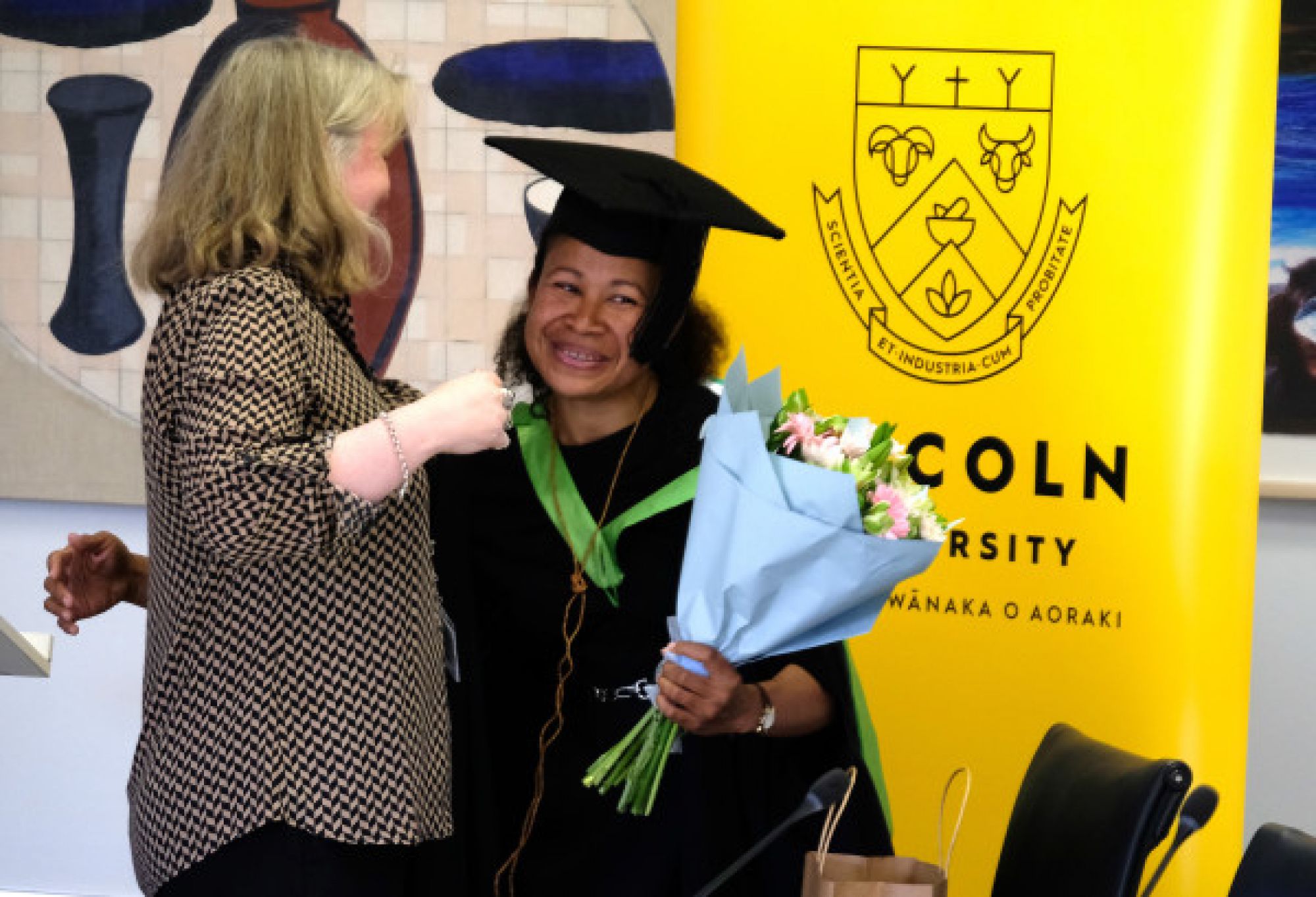
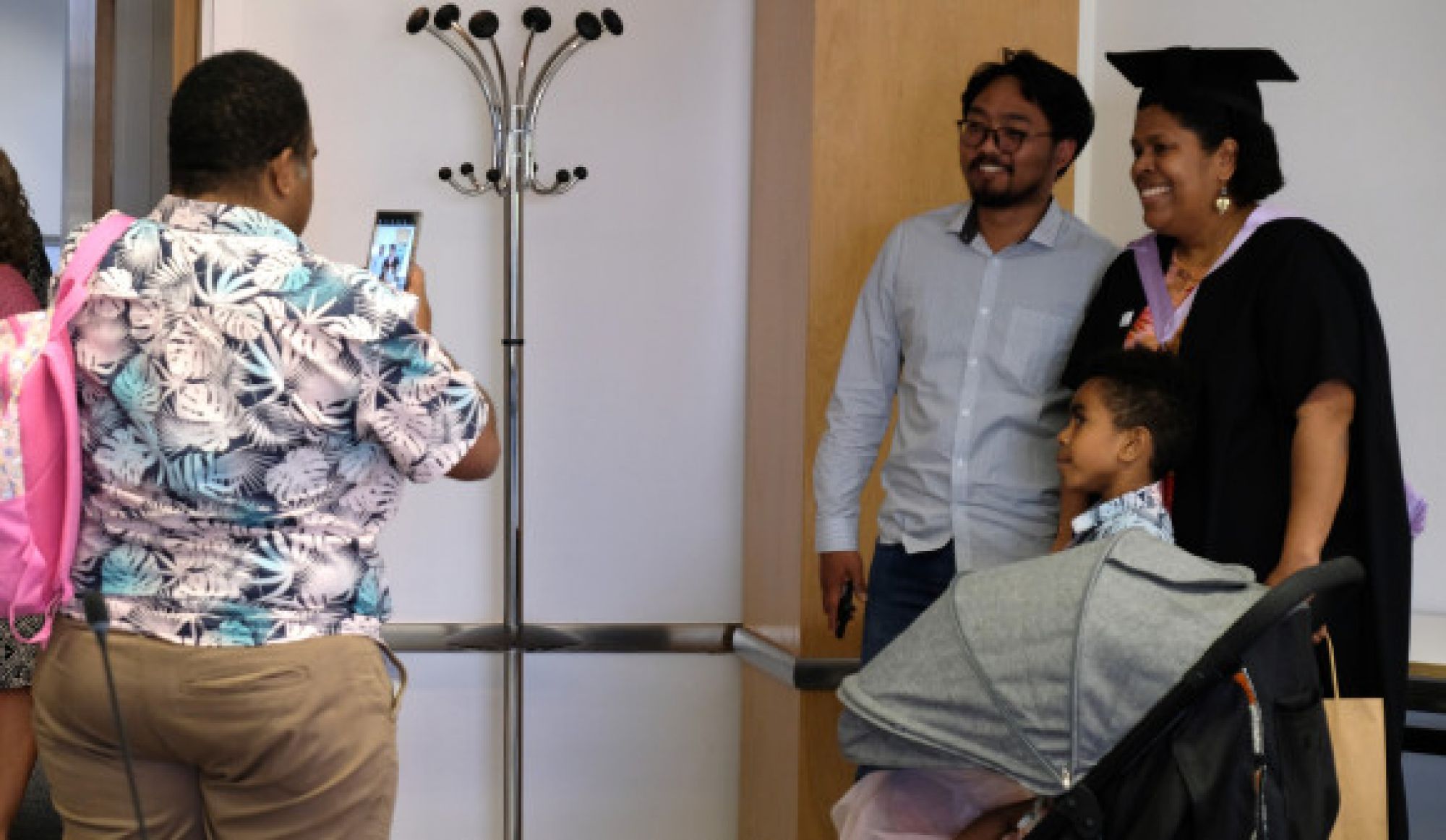
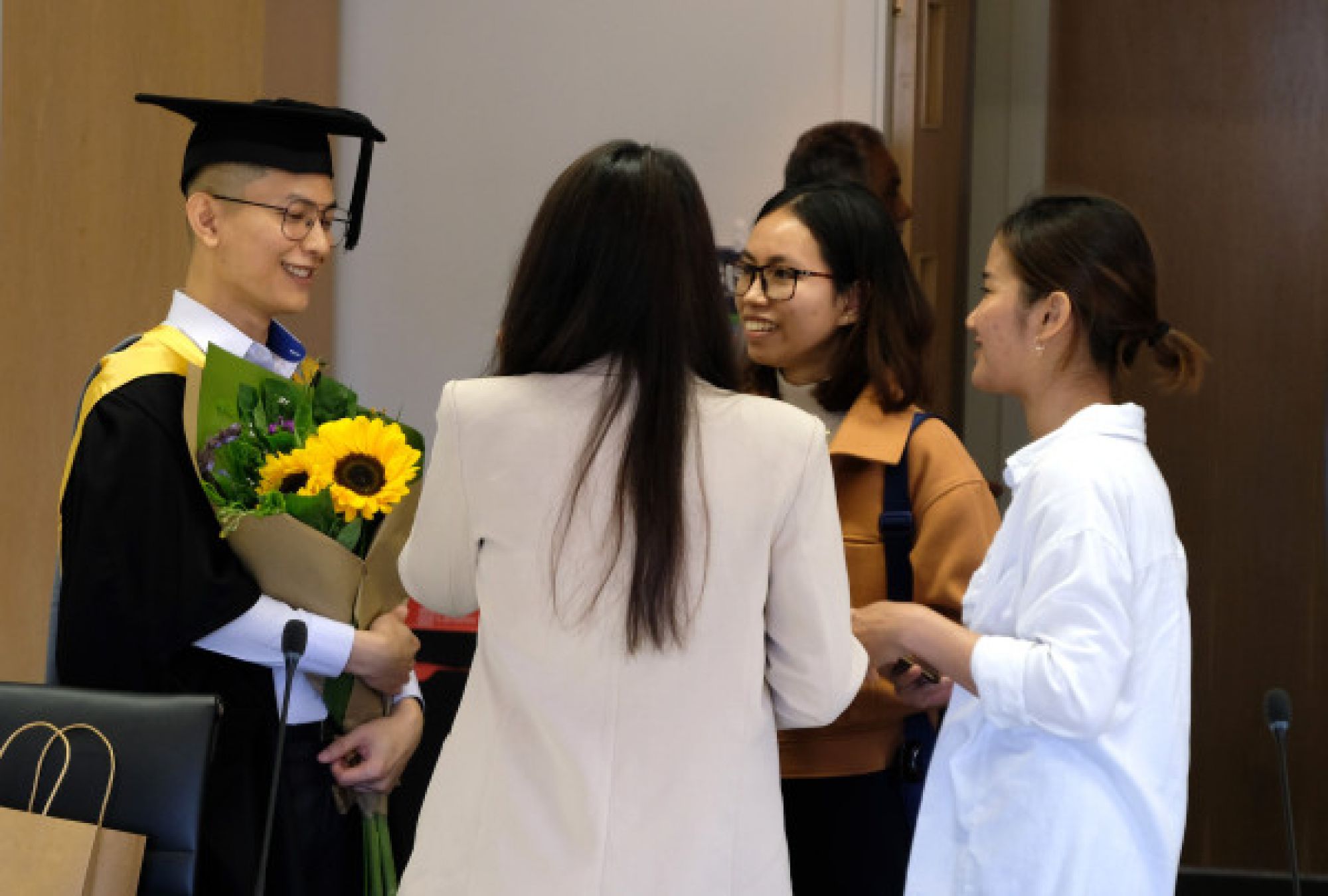
|
|
|
|

|
Research students planning on a sustainable future
Reshaping public transport, abolishing minimum parking requirements, and exploring the role of farmers markets... read more
Research students planning on a sustainable future
Reshaping public transport, abolishing minimum parking requirements, and exploring the role of farmers markets were some of the topics covered in a series of recent student research presentations.
The annual event, organised by the New Zealand Planning Institute, involved five Lincoln University Master of Planning students presenting their dissertation research to local government, planning consultancies, friends and families at Tūranga in Christchurch.
Each presentation provided insights and solutions for improving urban and regional landscapes, demonstrating the vital contribution that environmental planners can make in developing more sustainable and equitable cities and towns.
Jess Farrar discussed the role of farmers markets in promoting community wellbeing, using Lincoln and Rolleston markets as case studies, and showing how community-led initiatives can enhance public spaces as centres of trade and social connections.
Aidan Chrystal then presented his case study, Reshaping Public Transport, specifically highlighting rail as a viable option in Christchurch. In spite of the city's seemingly forgotten rail history, Aidan's international findings showed promise for reintroducing this mode of transport.
He linked this to the potential success of current Mass Rapid Transit proposals and suggested that rail might help shape urban design, emphasising transit-oriented planning.
Devon Ashcroft explored the likely effects of abolishing minimum parking requirements throughout New Zealand, a potentially radical shift that could have significant consequences for both small and large communities.
Drawing on global experiences, Devon demonstrated what the outcomes might look like for future transport planning and policymaking in New Zealand.
Mies VanHout presented a study examining the values expressed in social media posts regarding the Three Waters Act. By applying a social psychological framework, Mies explored public sentiment around this important environmental policy change in greater Christchurch.
The fifth presentation, given by Jack Davis, provided an in-depth quantitative analysis of walkability in three Christchurch neighbourhoods. Jack explored a potential correlation between the assessed walkability of a neighbourhood and the number of people actually walking.
Although his findings showed some inconsistencies across neighbourhoods, his research will prove valuable for urban planners, architects and policymakers aiming to design pedestrian-friendly communities.
The presentations showcased a wide spectrum of research, exploring both micro and macro elements of environmental planning.
Lincoln University's Master of Planning is accredited with the New Zealand Planning Institute, which enhances students' career prospects.
 The five Master of Planning students to present their research were (from left) Aidan Chrystal, Jack Davis, Devon Ashcroft, Jess Farrar, and Mies VanHout.
The five Master of Planning students to present their research were (from left) Aidan Chrystal, Jack Davis, Devon Ashcroft, Jess Farrar, and Mies VanHout.
|
|
|
|

|
Giving Day 2023
Thank you to all those who gave to this year's Giving Day held on Wednesday 8 November... read more
Giving Day 2023
Thank you to all those who gave to this year's Giving Day held on Wednesday 8 November.
Thanks to the amazing generosity of Lincoln University's alumni, staff, and friends of the University we raised over $201,000. Our deep gratitude to the LU extended whānau – both past and present, from around the country and from all over the world – who came together to support Lincoln University.
This year's Giving Day theme was 'Preserving our past, growing the future' with a special focus on Memorial Hall and Ivey West building, as both these buildings are currently being restored, following the 2010-2011 earthquakes. In 2028, we mark our 150th anniversary— a perfect time to celebrate our newly restored iconic Memorial Hall and Ivey's West and our rich history and to share our stories with generations to come.
Funds raised will go towards establishing new scholarships and creating heritage display areas to celebrate and share our rich history.
Development Officer Penny Curran is overwhelmed by the support and generosity of the Lincoln University community.
"Thank you to all our alumni and supporters, and a special thanks to our 'Matching Donors', who pledged donations ahead of Giving Day, and to the great mahi from our wonderful student and staff volunteers."
On 13 August 2024 we look forward to marking 100 years since Memorial Hall first opened and later in the year when restoration work has been completed, alumni will once again be able to visit Memorial Hall. This is particularly special as we think ahead to Lincoln University's 150th anniversary in 2028.

|
|
|
|

|
Supporting Viticulture students through 'Andy's Wine'
A group of winemaker friends and family of the late Andy Anderson, a hugely talented Lincoln alumnus, have released a world-class Central Otago pinot noir in his honour ... read more
Supporting Viticulture students through 'Andy's Wine'
A group of winemaker friends and family of the late Andy Anderson, a hugely talented Lincoln alumnus, have released a world-class Central Otago pinot noir in his honour, and Alumni can still purchase a bottle of very special 'Andy's wine'.
Proceeds from the sale of the wine – labelled "Andy" and made of grapes sourced from some of his favourite Central Otago vineyards – are going towards a Lincoln University viticulture and oenology scholarship to help foster talented, enthusiastic winemakers.
Andy, who sadly passed away from cancer in 2019 at the age of 50, was one of the first graduates of Lincoln's Bachelor of Viticulture and Oenology in 1998. He went on to gain many accolades in the winemaking field, working for wineries in several different countries around the world.
As head winemaker at Waikato's Takapoto Estate vineyard, Andy was the first New Zealander to win the International Wine and Spirit Competition Pinot Noir Trophy and the first person in the world to win it twice (in 2017 and 2018).
Timbo Deaker, who graduated with Andy in 1998, told Business Desk "It's a loving tribute to a legendary winemaker and everything from the grapes to the winemaking, bottling and packaging has been done for free," he said.
The pinot noir has received extraordinary reviews so far, with Kiwi masters of wine, Cameron Douglas and Bob Campbell, rating it 95 and 94 points respectively.
The Andy Pinot Noir 2020 is available for purchase via the Wine for Andy website, which also includes more information about the life and achievements of Andy Anderson.
|
|
|
|

|
Medallist Address with TLC Christmas
Lincoln University's Tuesday Lunch Club members celebrated their final gathering for 2023 with an address by 2021 Bledisloe Medallist, Jeff Grant... read more
Medallist Address with TLC Christmas
Lincoln University's Tuesday Lunch Club members celebrated their final gathering for 2023 with an address by 2021 Bledisloe Medallist, Jeff Grant, and a Christmas Lunch on campus.
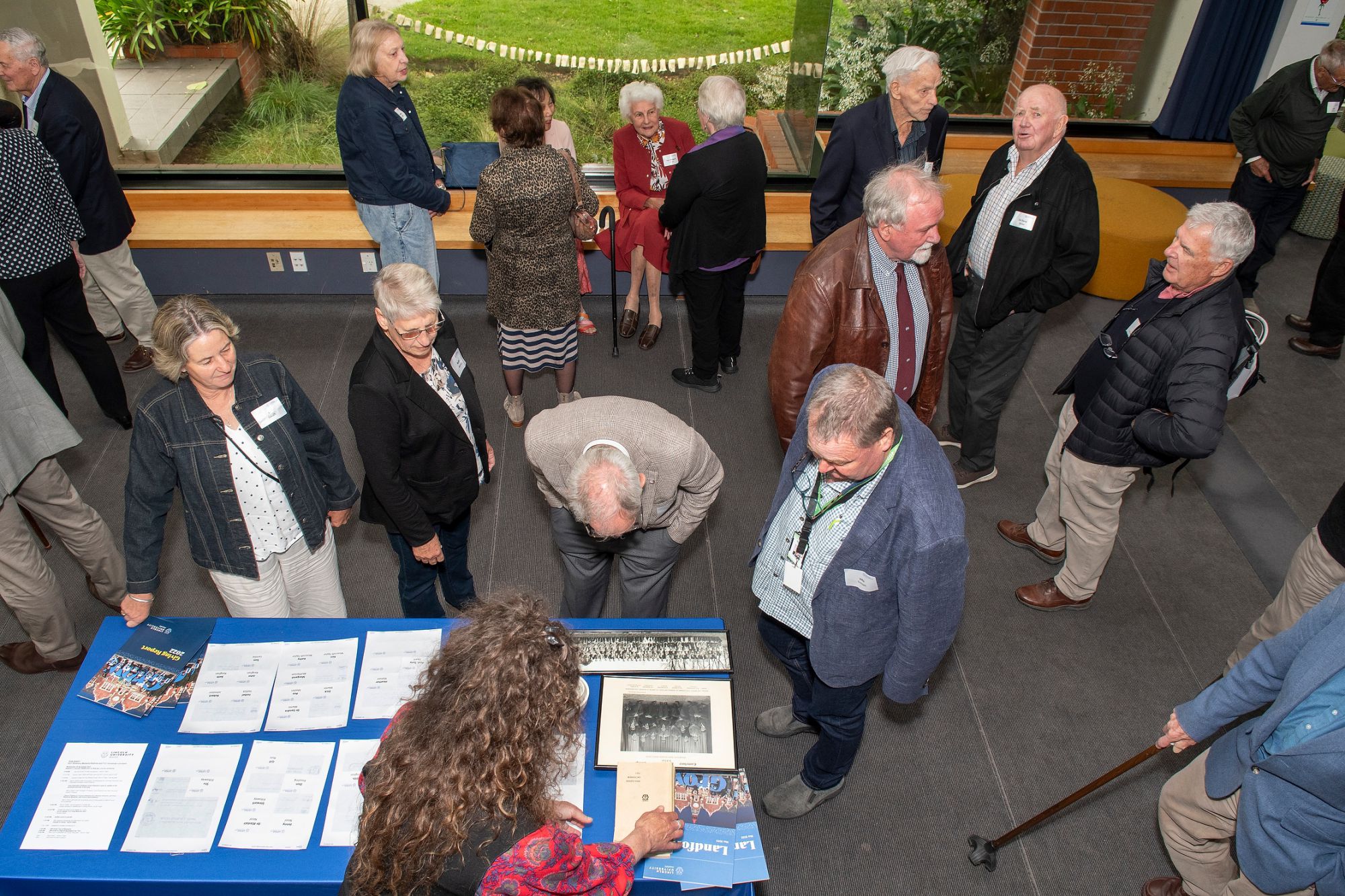
Alumni and Development Director, Noami Wilde, welcomed everyone onto campus and introduced Vice-Chancellor Professor Grant Edwards who presented a very positive University update, confirming a 45% growth in the domestic student population since 2019, and that student enrolments have exceeded 4300, making Lincoln the largest it's ever been as a University.
2021 LU Bledisloe Medallist and guest speaker, Jeff Grant, has had a dynamic and successful career in land-based industries in New Zealand. He told the audience that 23 of the previous LU medal recipients have had a major influence on his life, and proceeded to give an outstanding and thought-provoking address about the world of agriculture and New Zealand's future in it. Regarding sustainability policies for agriculture in New Zealand, Jeff reiterated the importance of getting policies and direction aligned right from the start saying, "Policy and climate change plans with land, water and bio-diversity need a holistic approach".
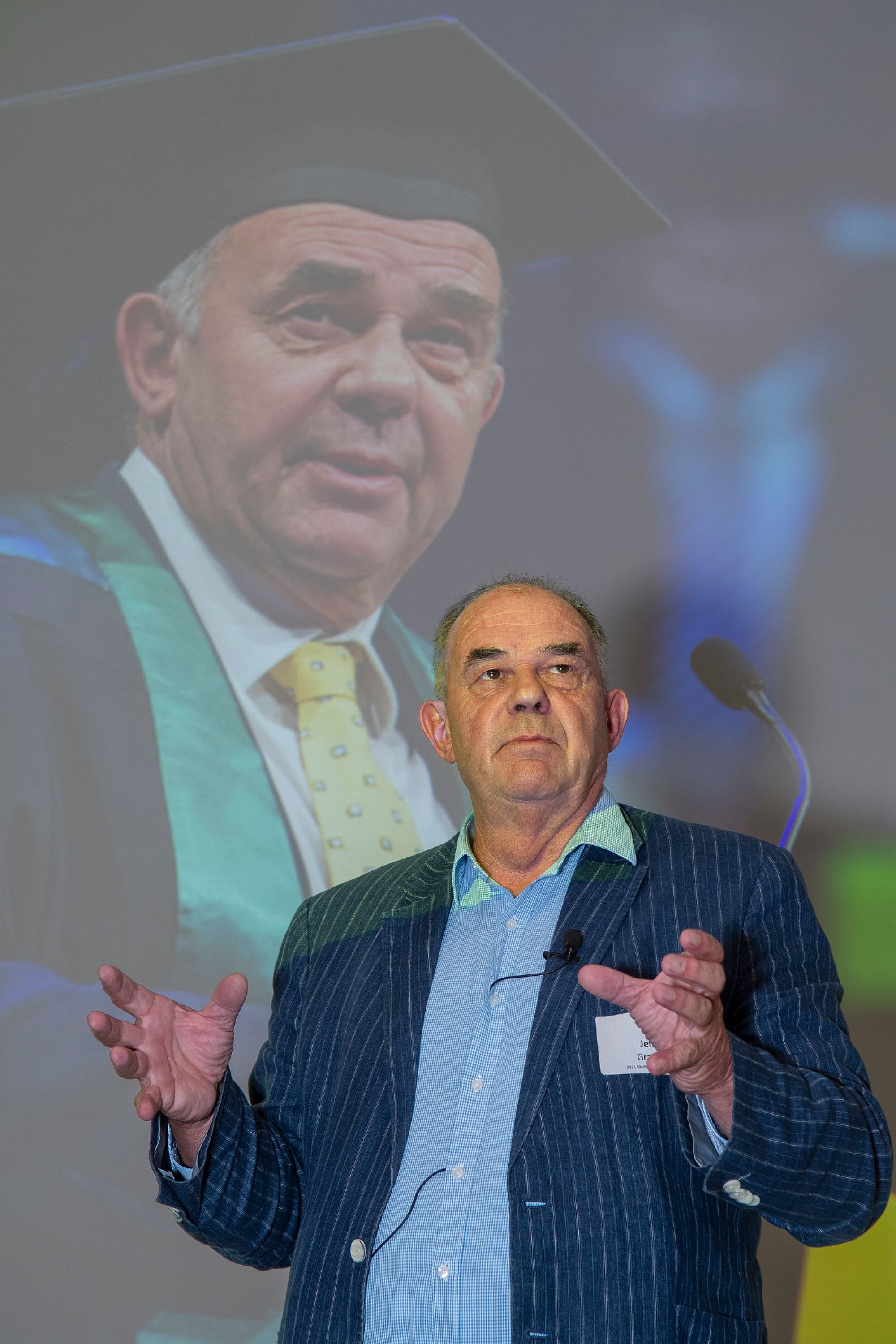
2021 Bledisloe Medallist, Jeff Grant
Following the Medallist Address, a delicious Christmas Buffet Luncheon in Te Kete Ika (Dining Hall) was enjoyed, concluding with a tour of our new science building, Waimarie.
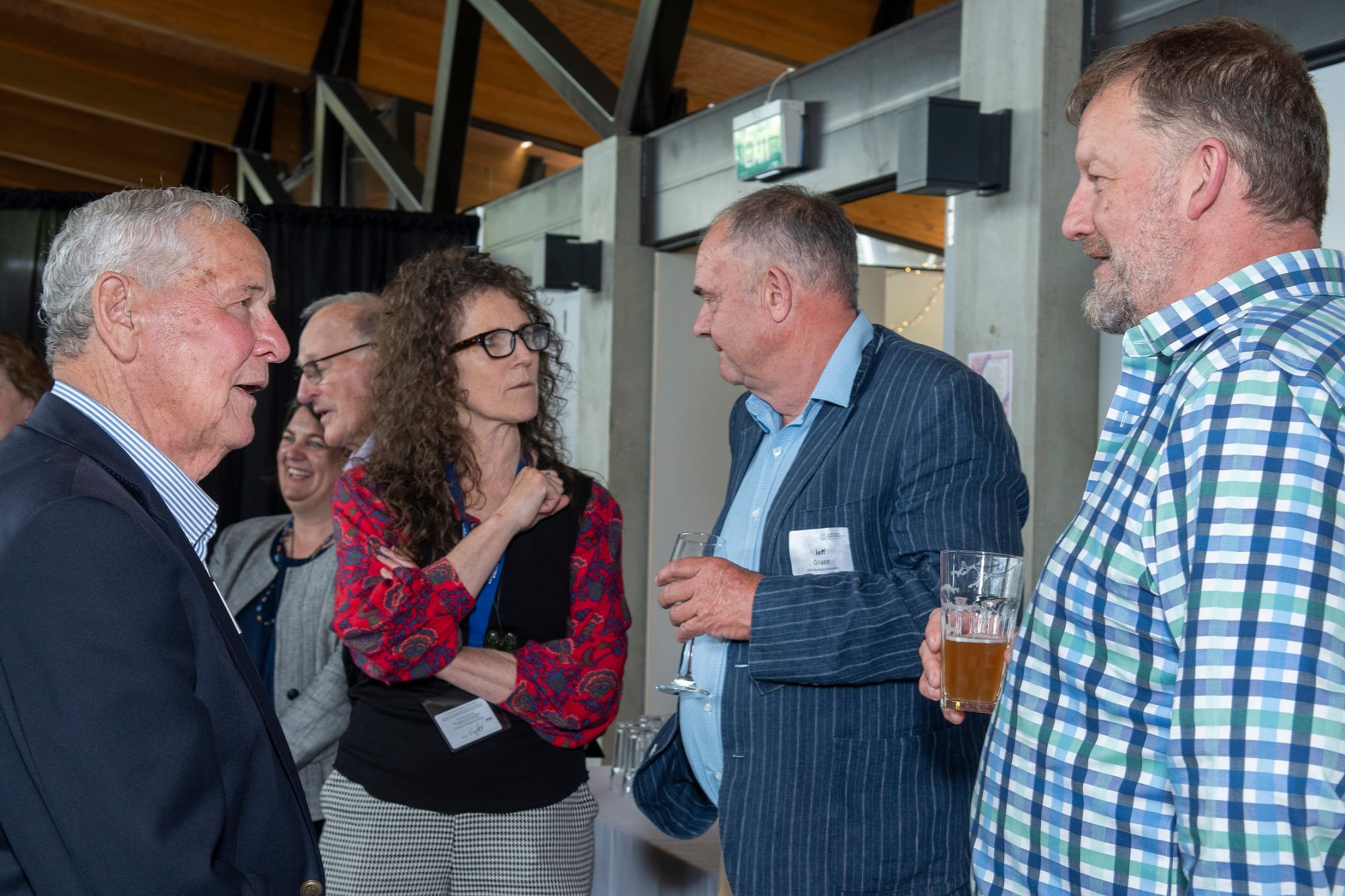
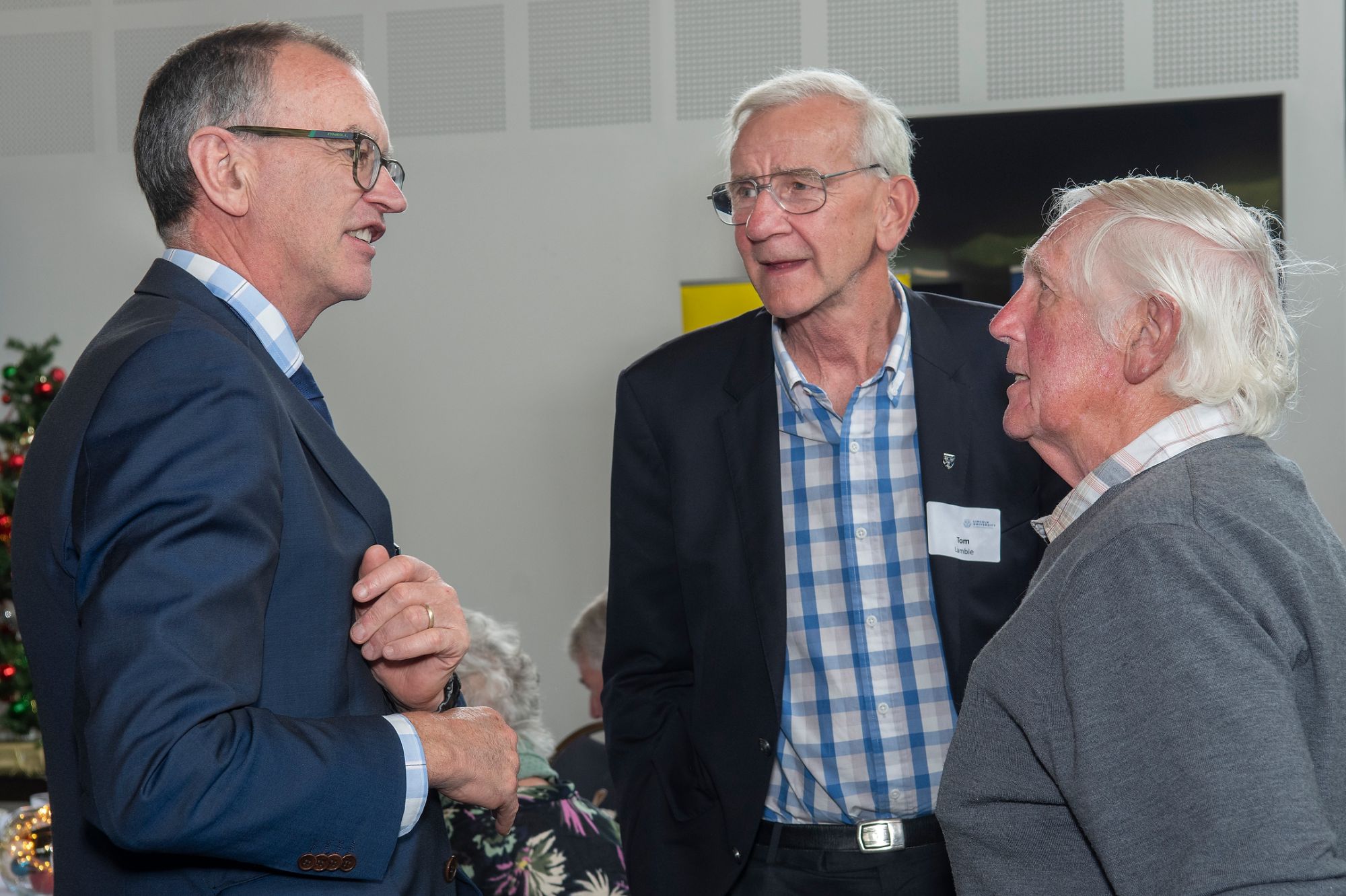
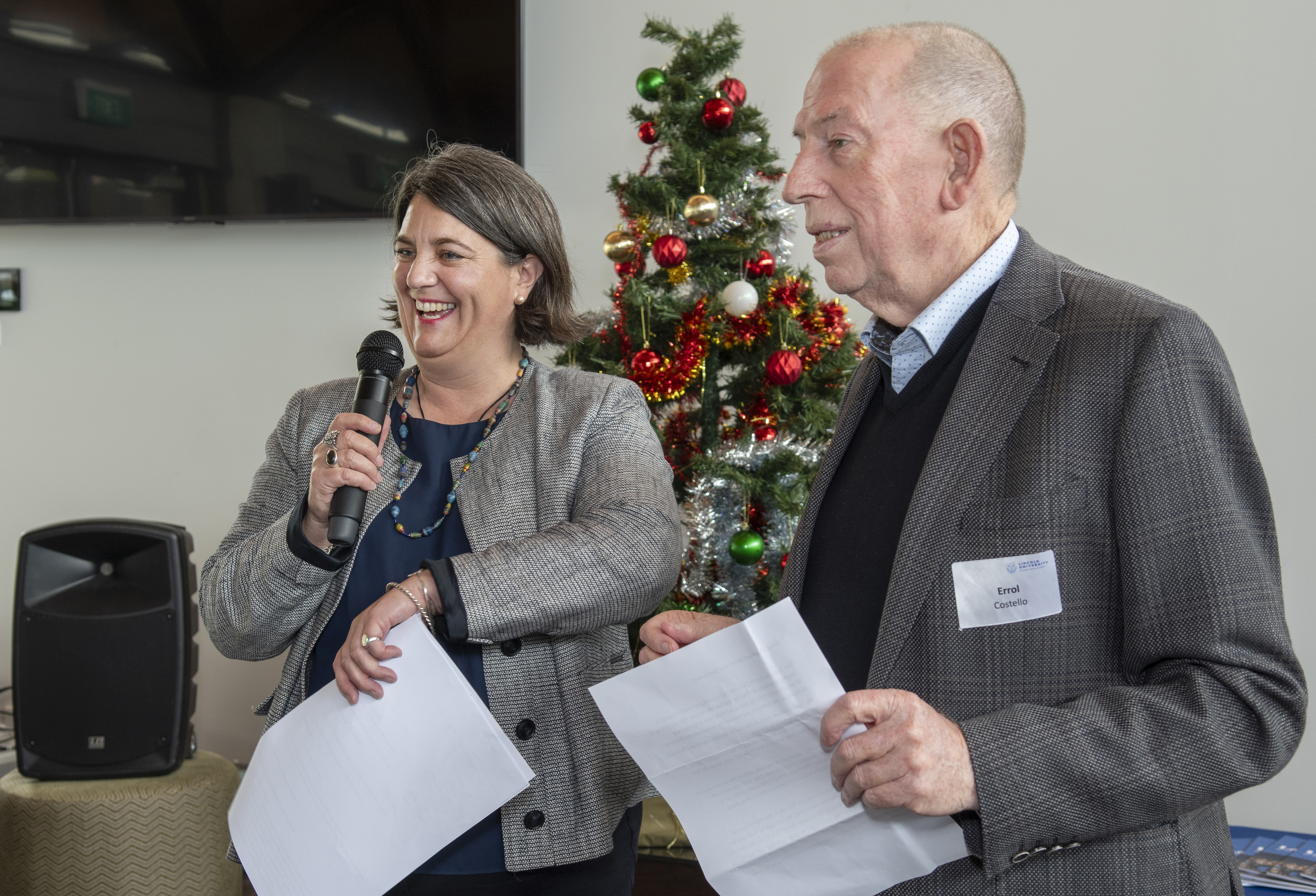
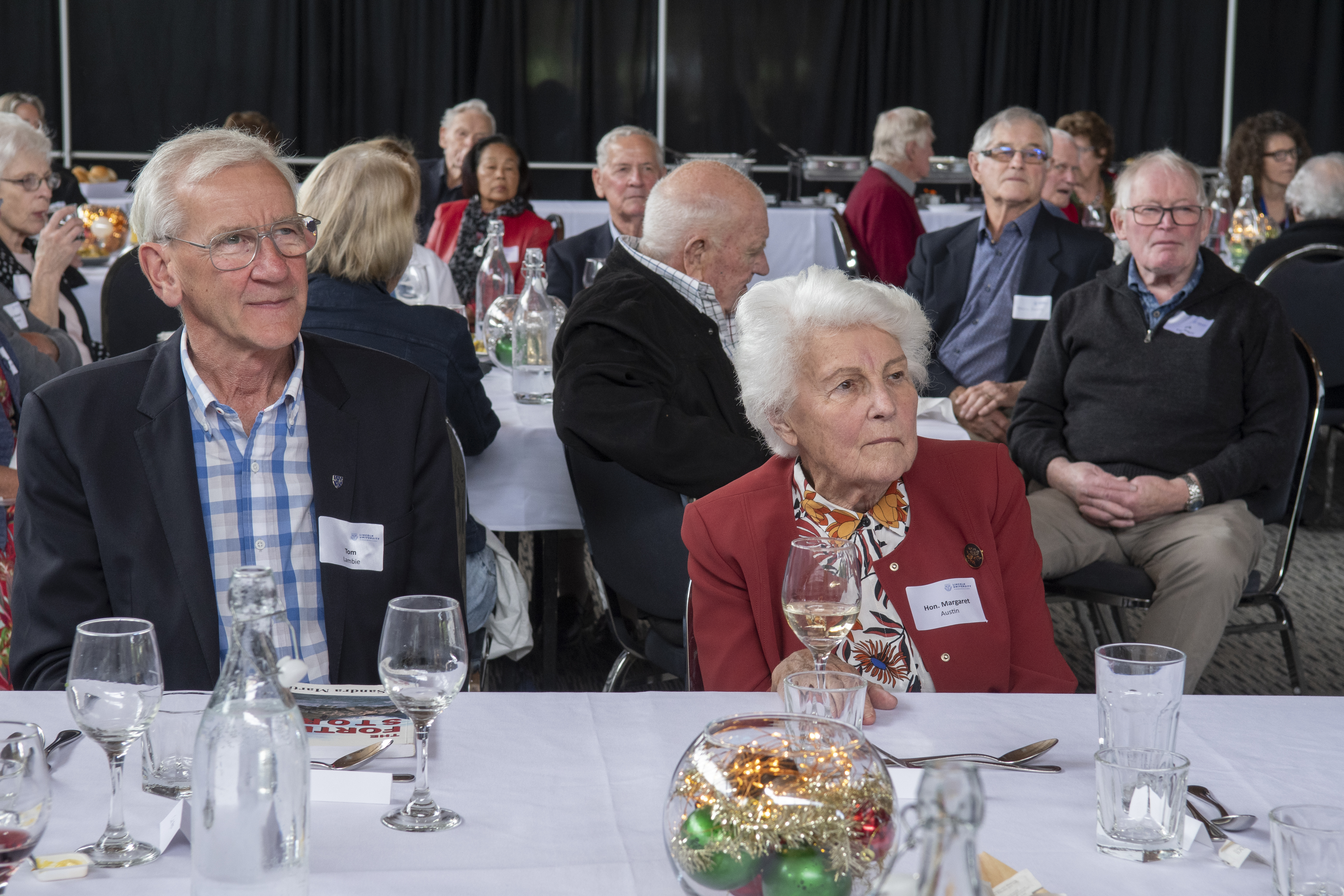

|
|
|
|

|
Class of 1959 Reunion
In a heartwarming reunion spanning the weekend of 10 – 12 November, former agricultural degree students from Lincoln University came together in Christchurch...
read more
Class of 1959 Reunion
In a heartwarming reunion spanning the weekend of 10 – 12 November, former agricultural degree students from Lincoln University came together in Christchurch. The occasion marked not only a celebration of shared experiences, but also a poignant moment, as the group remembered the passing of Tony Whatman, a cherished staff member at Lincoln, and co-organiser of the reunion alongside Allan Gillingham.
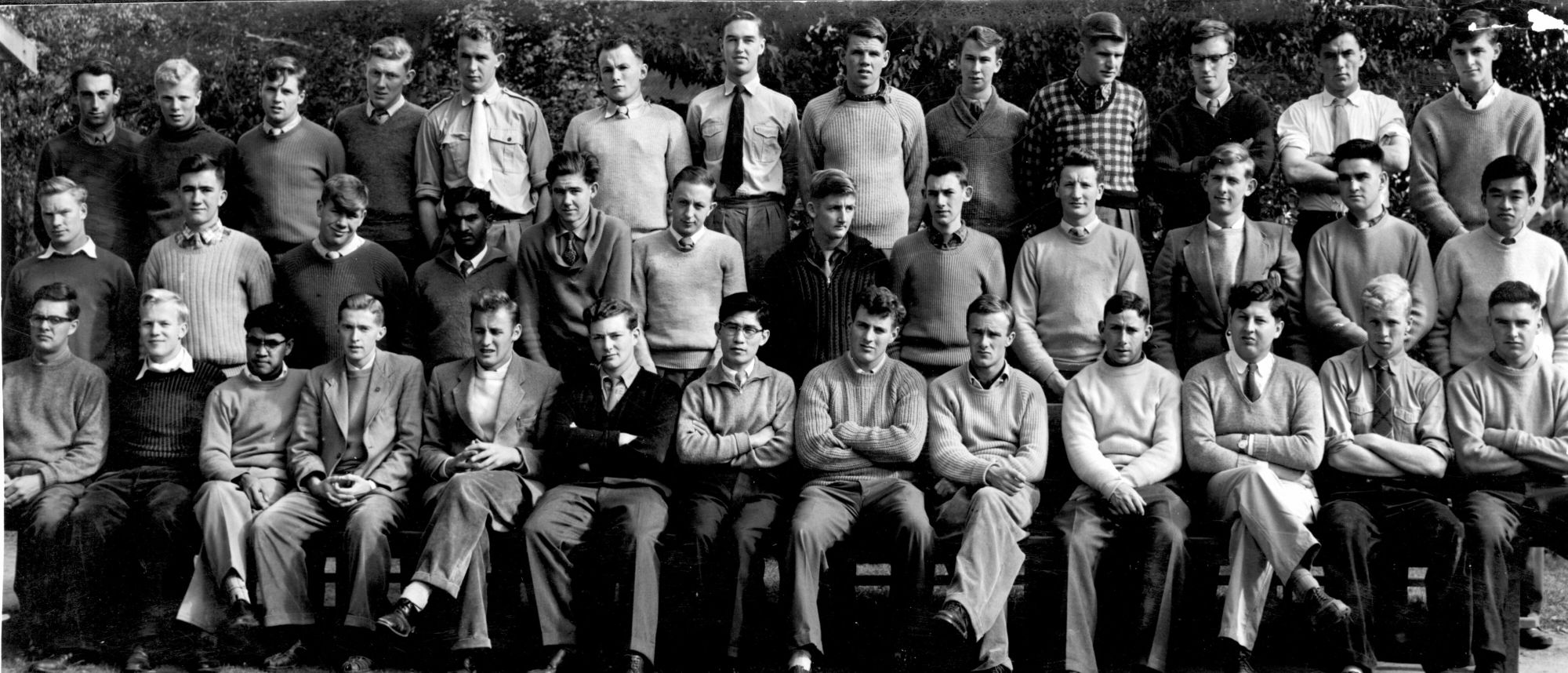
The gathering, which drew around 25 attendees, including former students, spouses, and widows of former classmates, was a testament to the enduring bonds forged during their academic years at Lincoln which began for this group in 1958/59.
An introductory dinner on the Friday night was followed by a visit to the university on Saturday morning. Attendees were left in awe of the advanced study areas and state-of-the-art lecture room facilities now available, and the university update they received shared promising prospects for Lincoln's future, leaving a lasting impression on the group.
 Saturday evening saw laughter fill the Commodore Hotel as individuals regaled the group with humorous anecdotes from their time at Lincoln. One story recounted a near-kidnapping of the Governor General, who arrived to open the new library but found himself almost hijacked by spirited students eager to lay a foundation stone for the undecided location of the new Veterinary School. While the initial plan didn't succeed, a humorous twist followed as a spade meant for planting a memorial tree was comically replaced with a spoon!
The programme wrapped up with a relaxing Sunday morning coffee session at the Botanic Gardens, prompting discussions about their next reunion and reminiscing about the unforgettable moments shared.
The success of the reunion was not without the support and hospitality of the Alumni and Development Team, who played a pivotal role in making the reunion a cherished and memorable event.
As the reunion ended, the collective sentiment echoed: "When will we do it all again?"
Saturday evening saw laughter fill the Commodore Hotel as individuals regaled the group with humorous anecdotes from their time at Lincoln. One story recounted a near-kidnapping of the Governor General, who arrived to open the new library but found himself almost hijacked by spirited students eager to lay a foundation stone for the undecided location of the new Veterinary School. While the initial plan didn't succeed, a humorous twist followed as a spade meant for planting a memorial tree was comically replaced with a spoon!
The programme wrapped up with a relaxing Sunday morning coffee session at the Botanic Gardens, prompting discussions about their next reunion and reminiscing about the unforgettable moments shared.
The success of the reunion was not without the support and hospitality of the Alumni and Development Team, who played a pivotal role in making the reunion a cherished and memorable event.
As the reunion ended, the collective sentiment echoed: "When will we do it all again?"
|
|
|
|
Save the Date - Upcoming Reunions
|
|
|
BAgSc and HortSc and BAgCom 1977-1978 Reunion
Friday 22 March 2024
Christchurch
Key Organisers: Kim Stevenson and Jim Davis
BAgSc and BHort 1974 - 50 Years On Reunion
23-24 March 2024
Auckland
Key Organiser: Paul Lysaght
DipVFM 1969 - 55 Years On Reunion
11-12 April 2024
Wellington
Key Organisers: Barry Brook and Ted Marshall
DipAg 1984 - 40 Years On Reunion
12 & 13 April 2024
Key Organiser: Michelle Power
BAgSc and BHort 1980 Reunion
24-25 May 2024
Christchurch
Key Organiser: Richard Christie
Spread the word about these reunions - many classmates may not have contact details in our database, so
we need their email addresses to let them know about reunions.
For more information about any of these reunions, please contact the alumni team at: alumni@lincoln.ac.nz
|
|

|
Lincoln University Obituaries - December 2023
Lincoln University acknowledges with respect the recent passing of the following alumni and supporters... read more
Lincoln University Obituaries - December 2023
Lincoln University acknowledges with respect the recent passing of the following alumni and supporters:
Brian Alexander Bremner (Intensive Course, 1957), Christchurch, 8 December 2023, aged 87
Mark Anthony Collins (Cert. Wool, 1956), Christchurch, 26 November 2023, aged 89
Austin John Ebert (DipAg, 1945), Christchurch, 7 December 2023, aged 98
Richard Gregory Ferris (BAgCom, 1981), Invercargill, 7 November 2023, aged 62
Richard (Rick) George Rockliff (DipAg, 1968), Sassafras, Tasmania, 28 November 2023, aged 79
Alan Oliver Taggart (DipAg, 1958), Ashburton, 14 December 2023, aged 86
Bertram (Snow) Thomas (DipAg, 1951), Tasmania, 14 October 2023, aged 92
Thomas (Tom) Floyd Trail (Visiting Professor at LU), Idaho, USA, 2 November 2023, aged 88
Anthony (Tony) Charles William Whatman (BAgSc, 1962), Christchurch, 3 November, aged 83
|
|
|
|
| Do you have a story to share? Are there topics you'd like us to cover in this publication? We'd love to hear from you. Please contact us at alumni@lincoln.ac.nz. |
|
|

